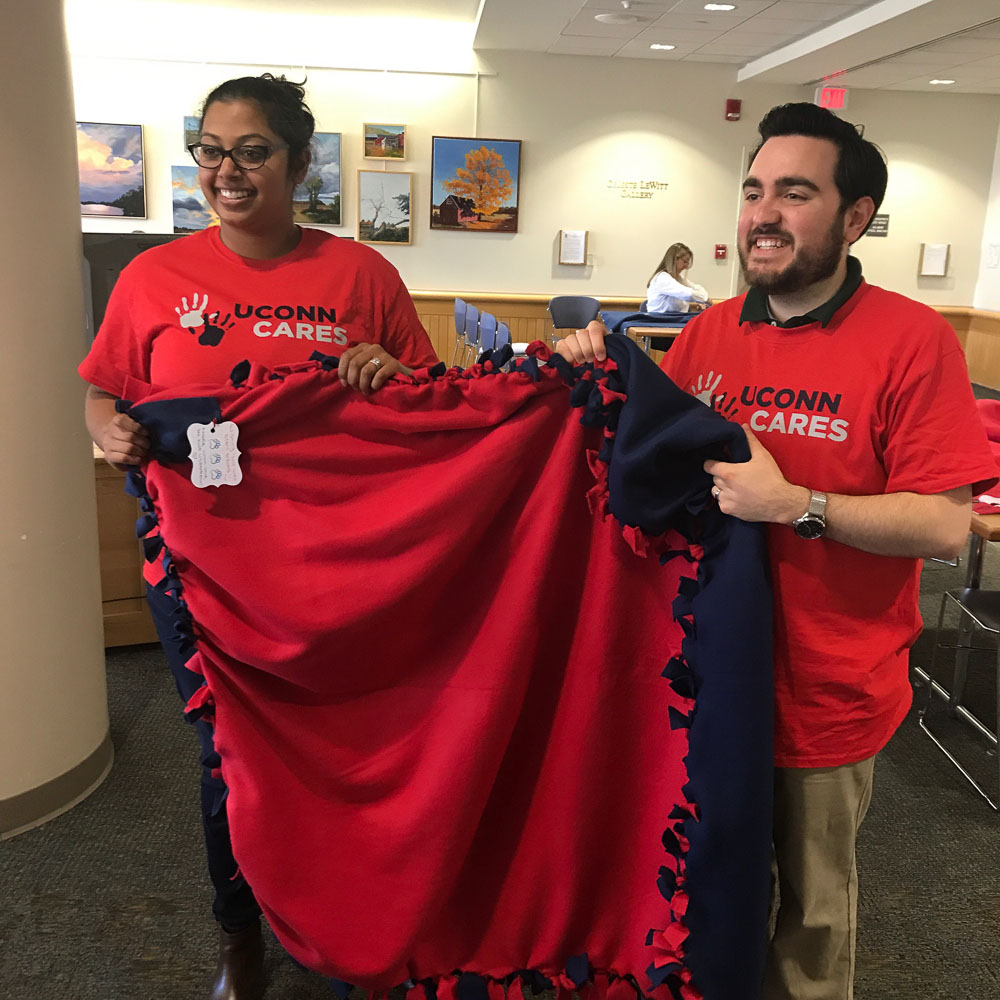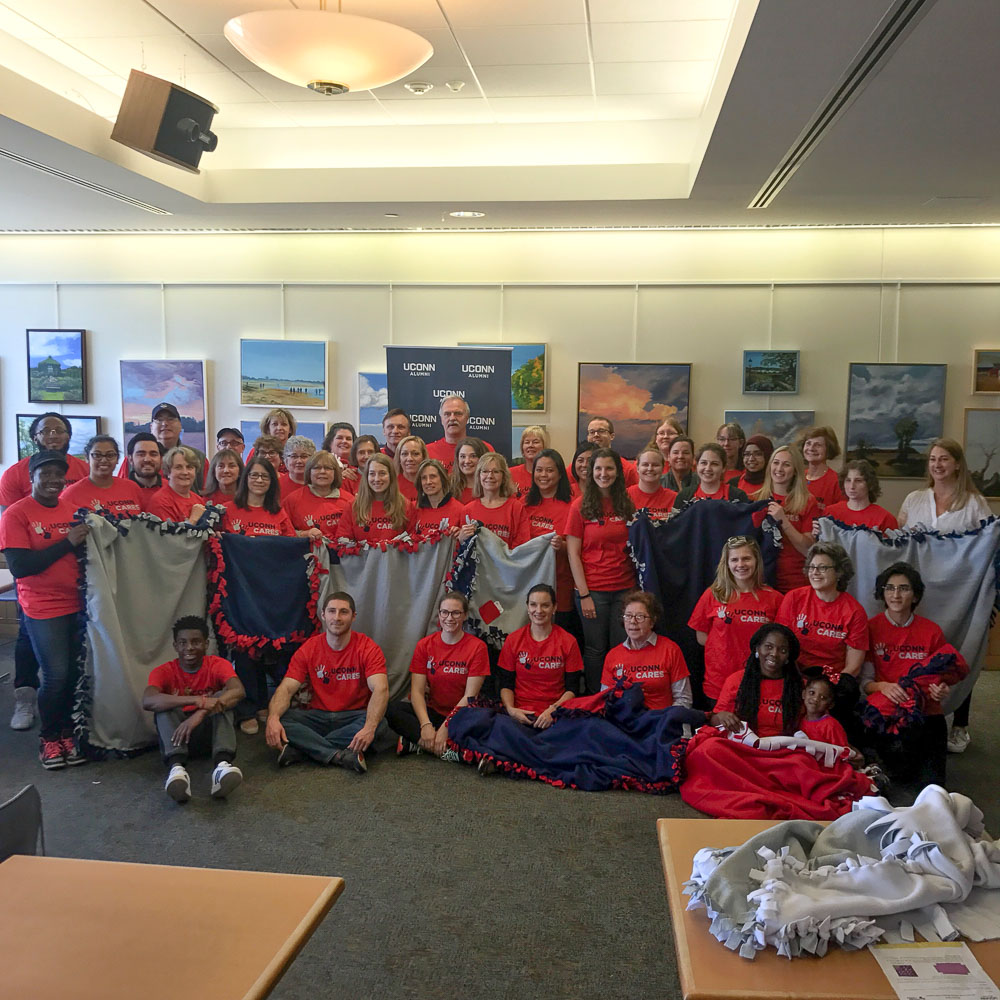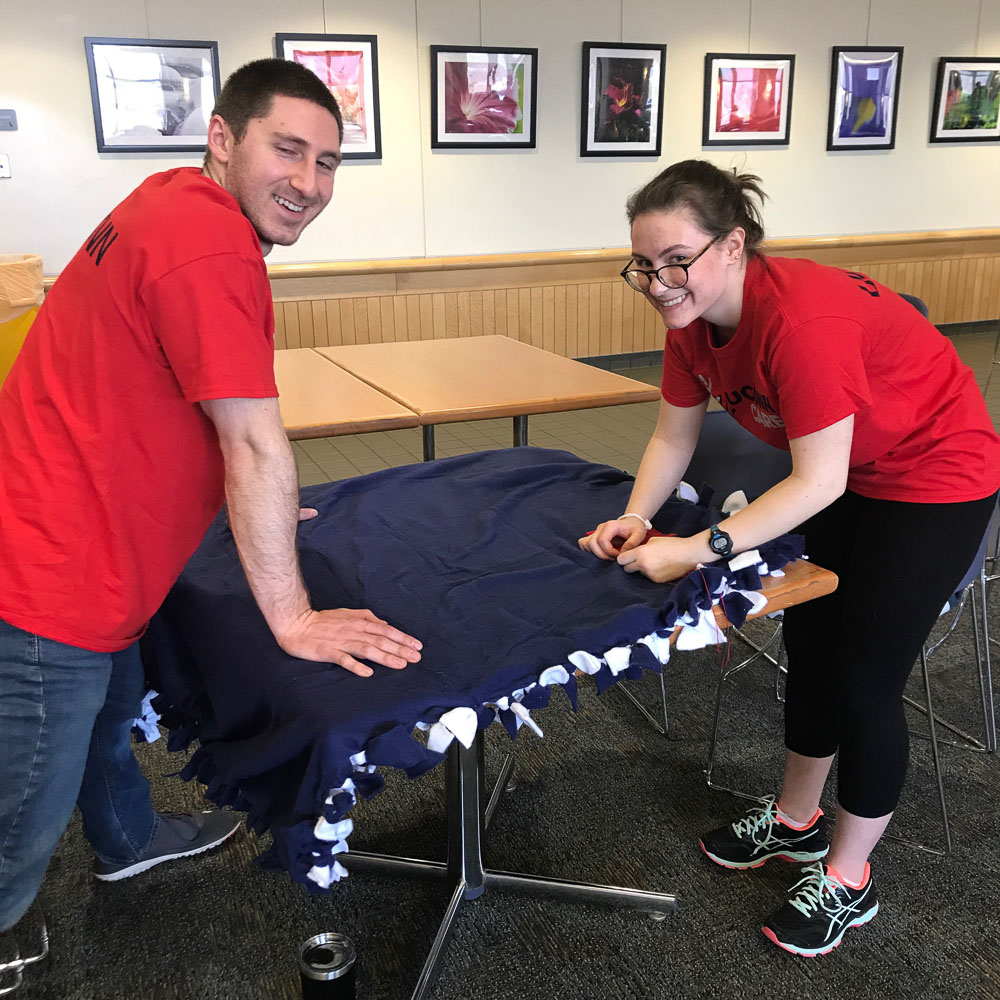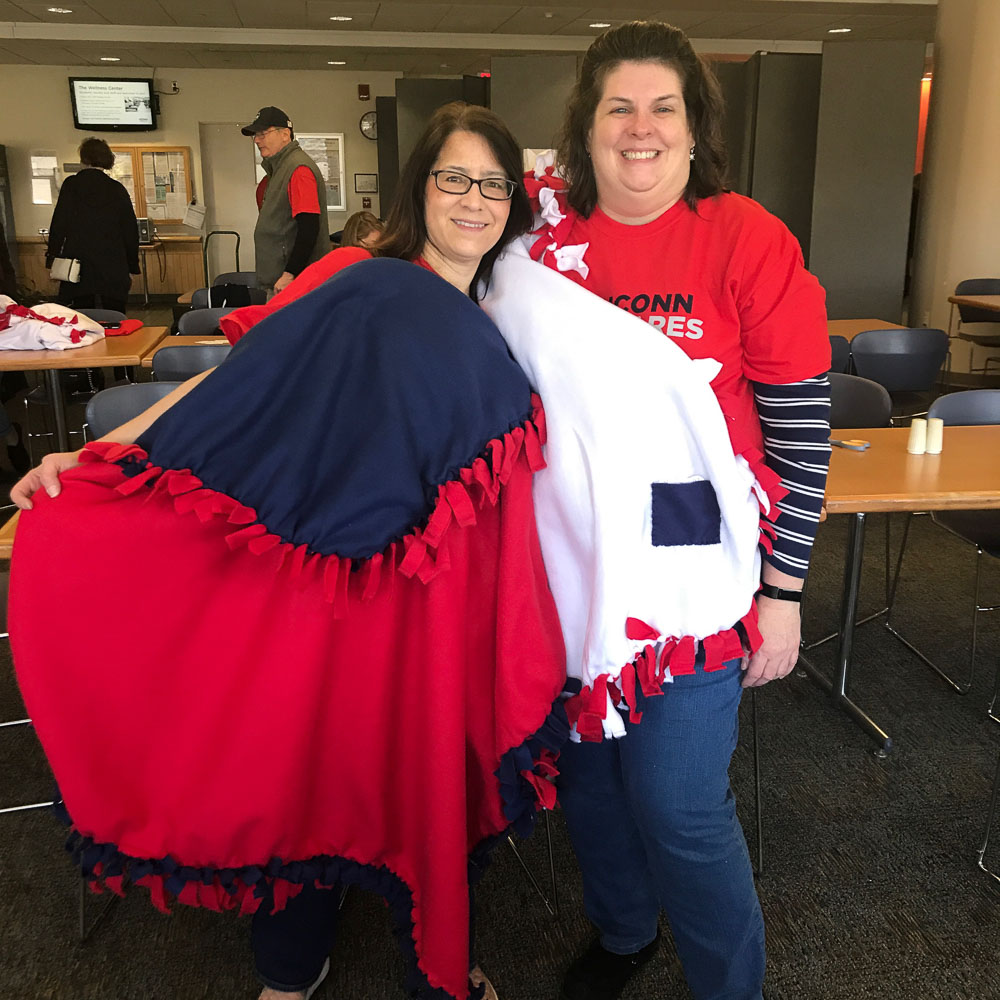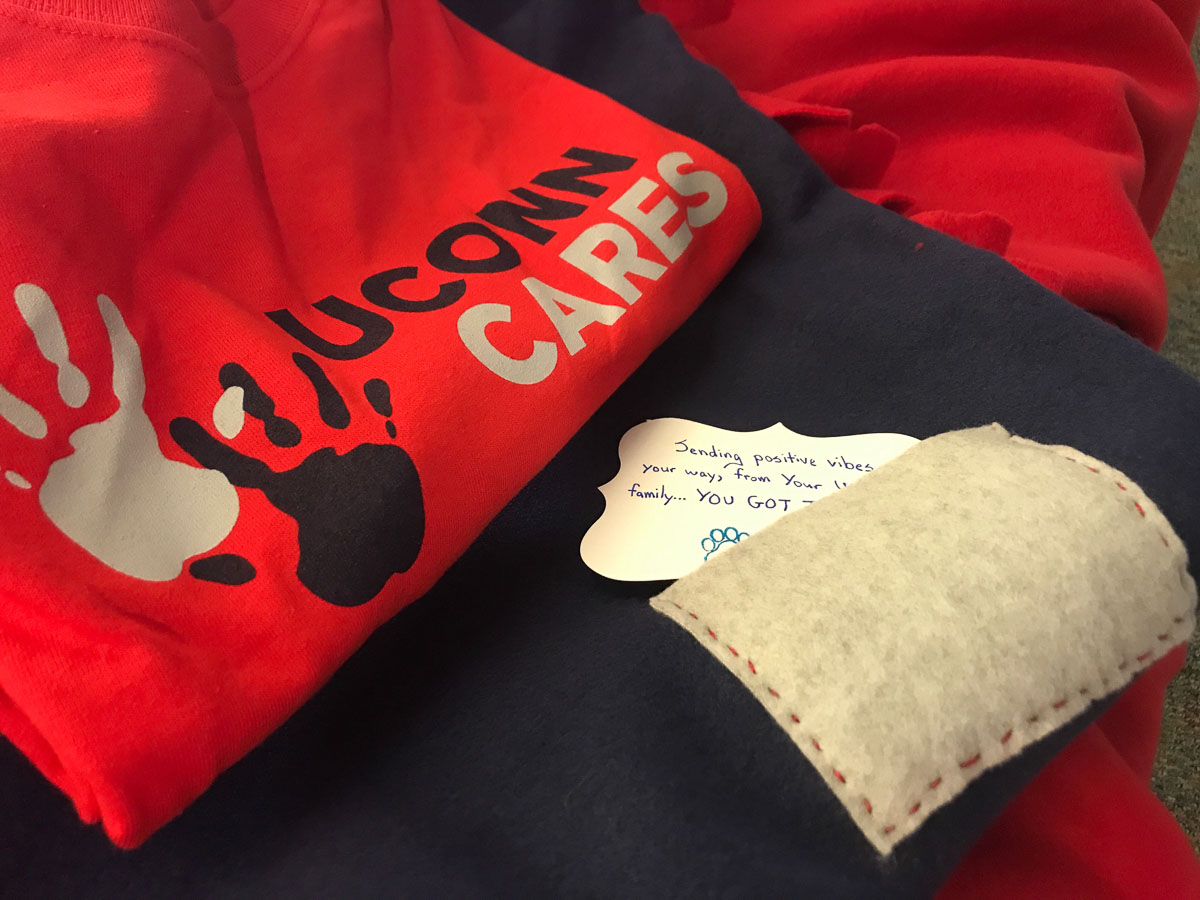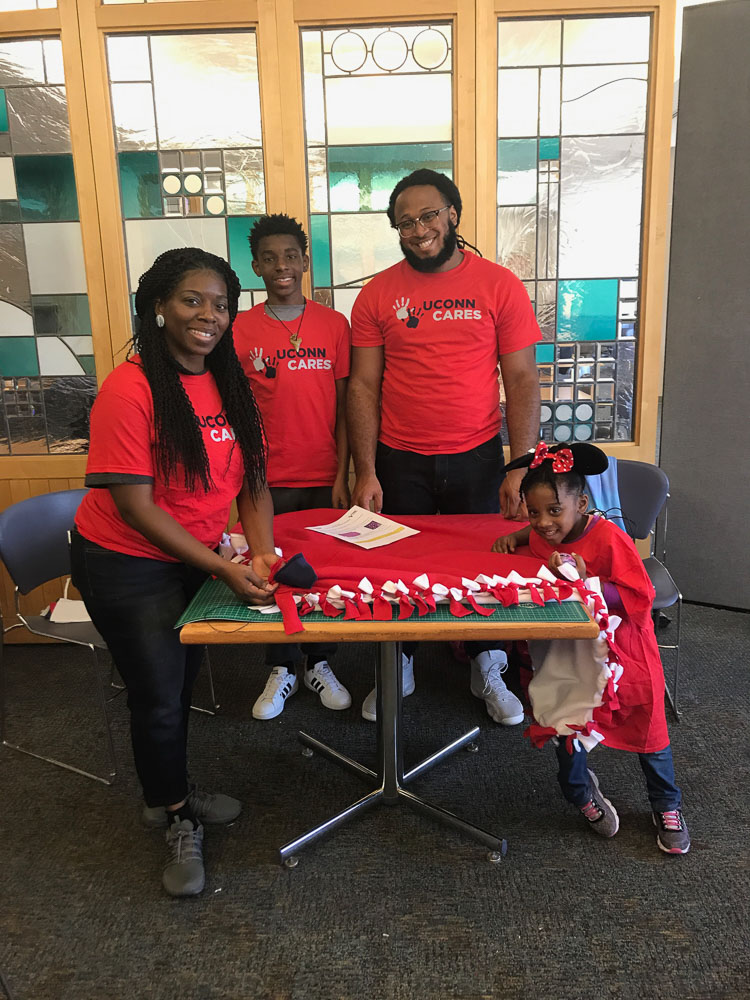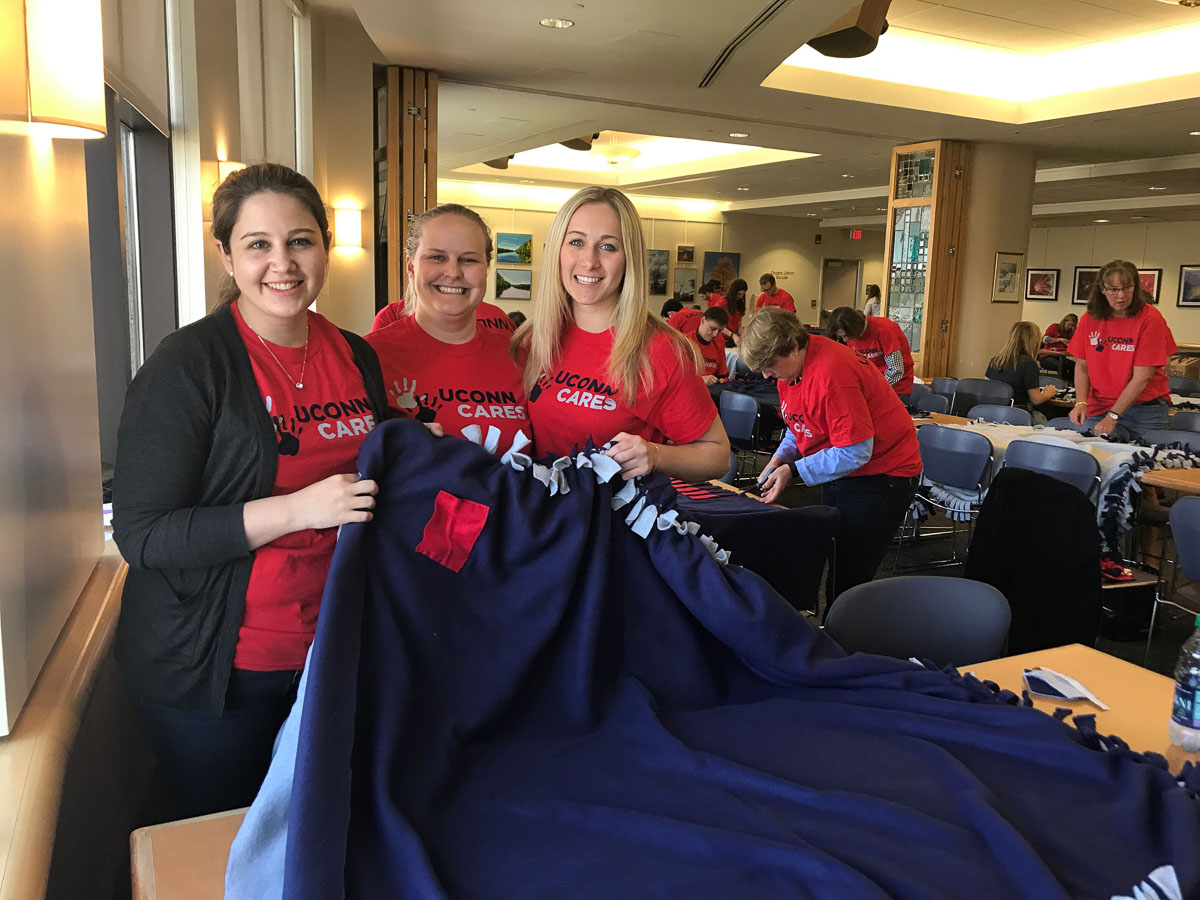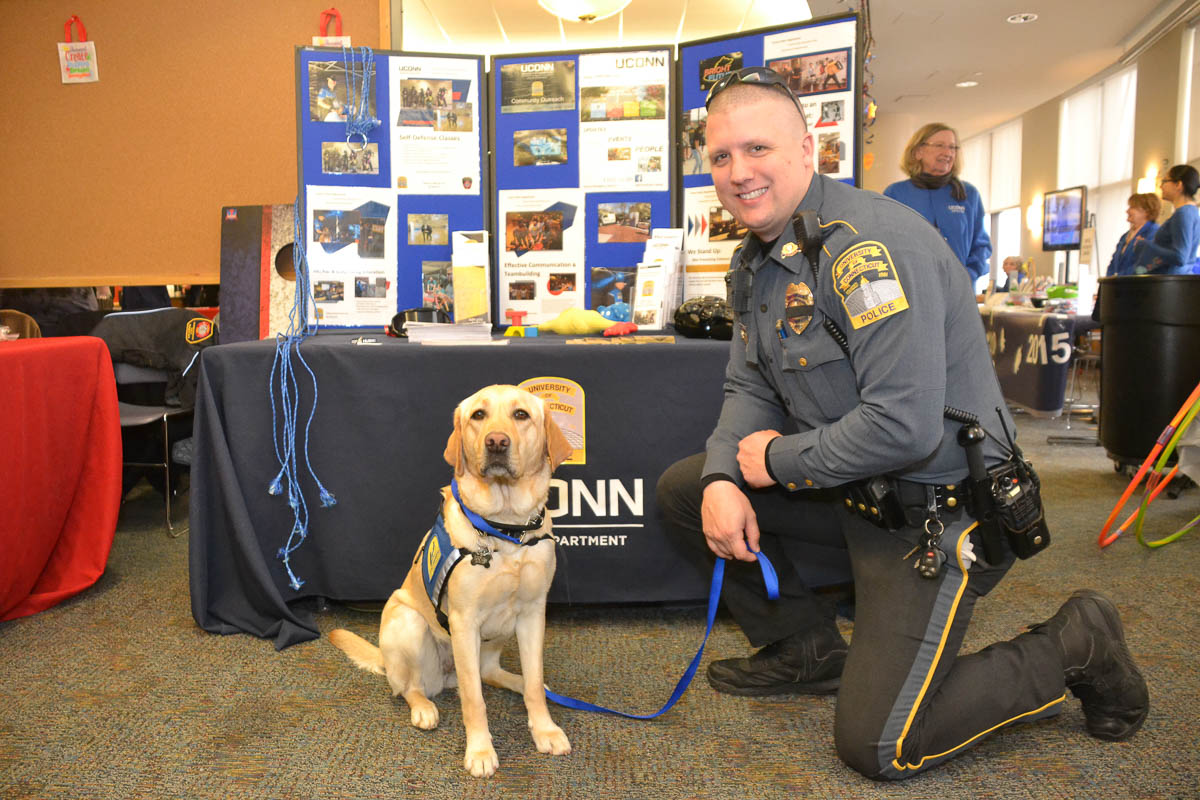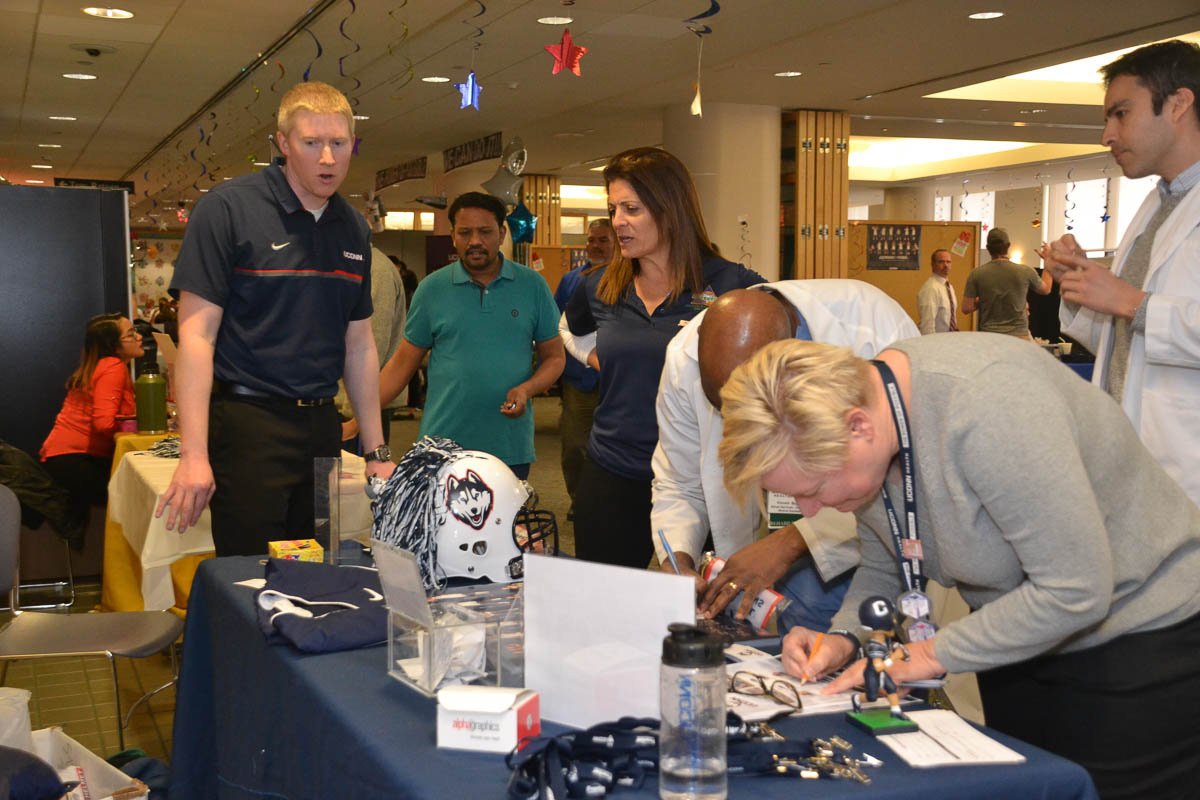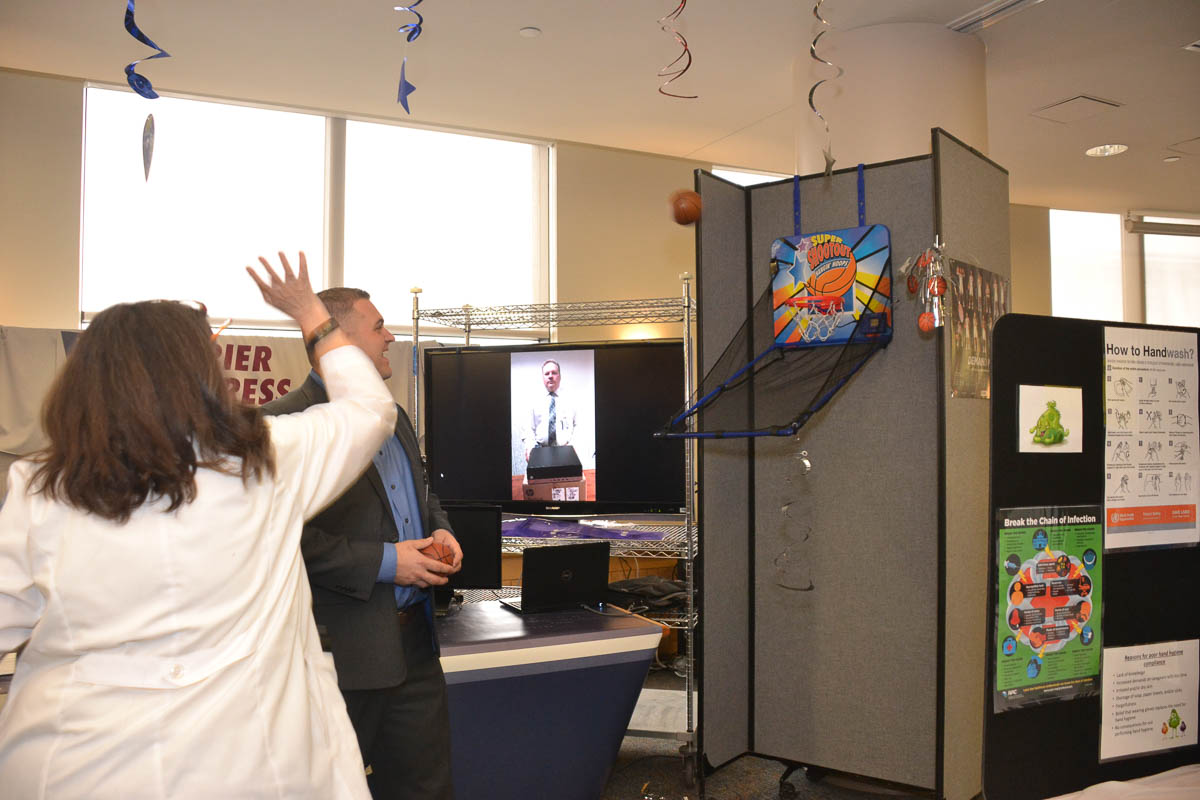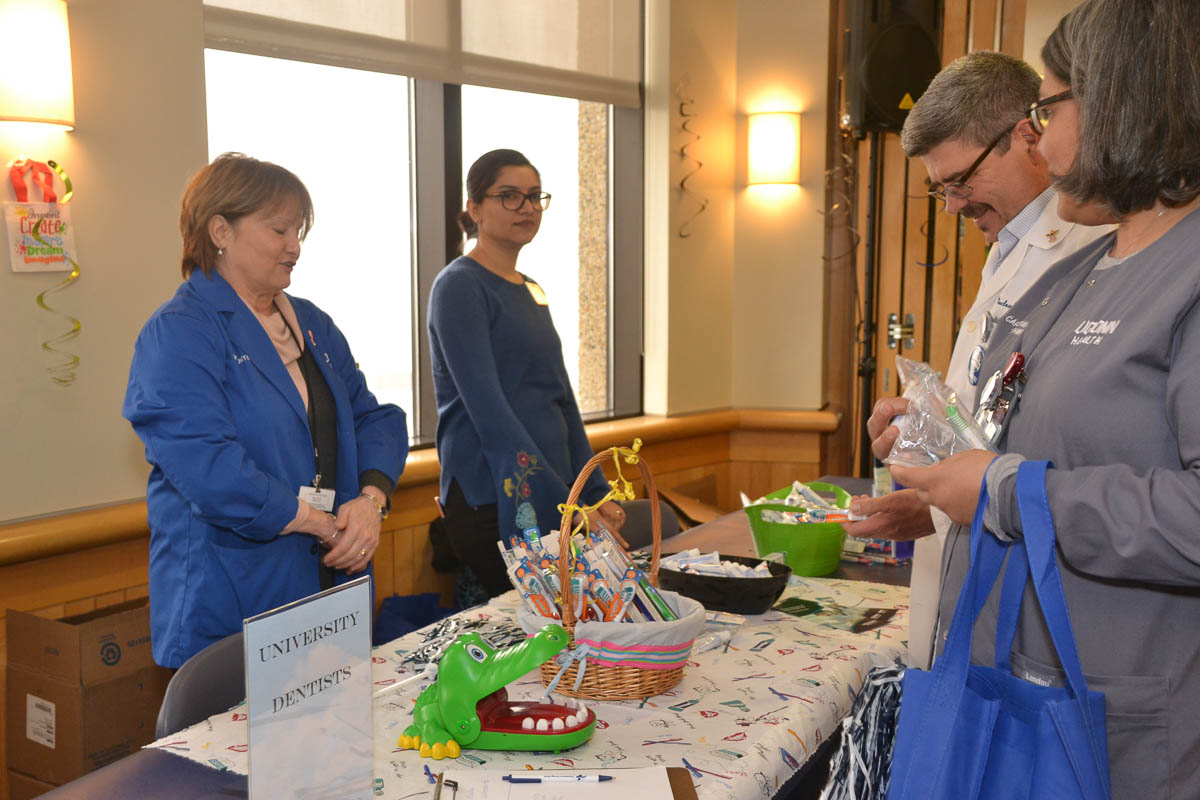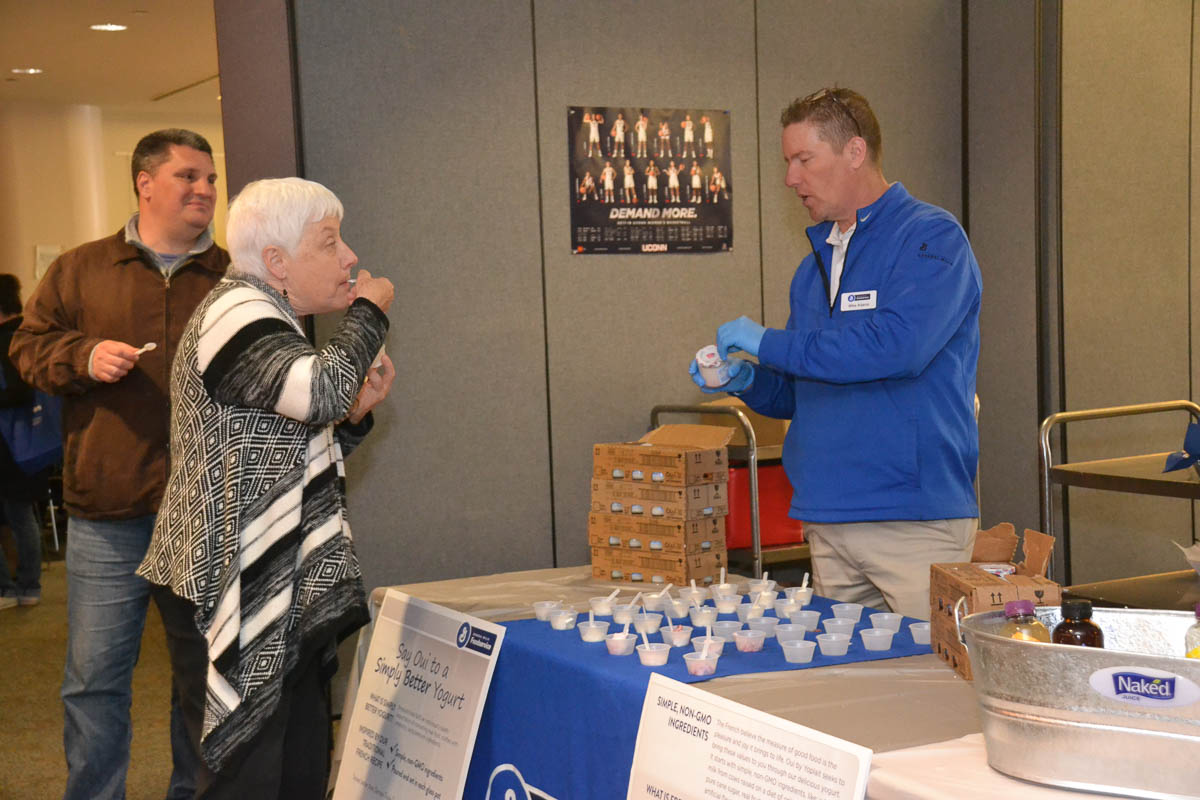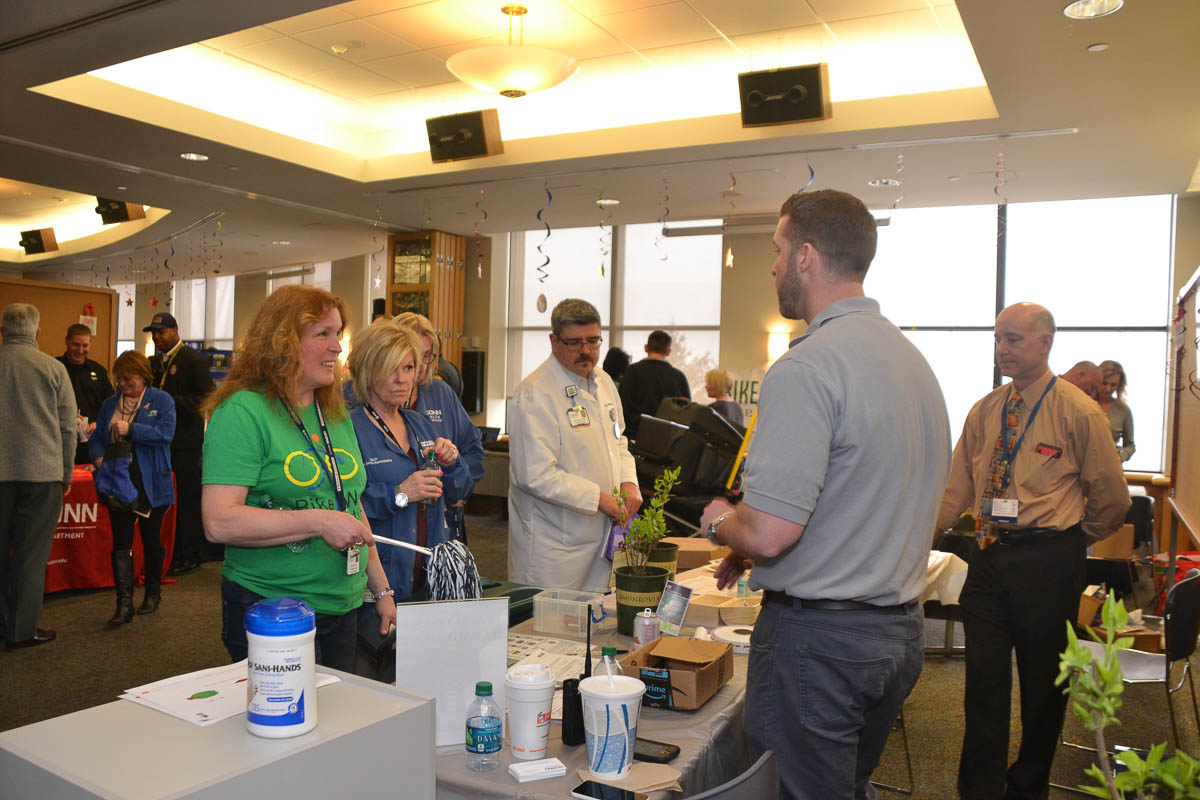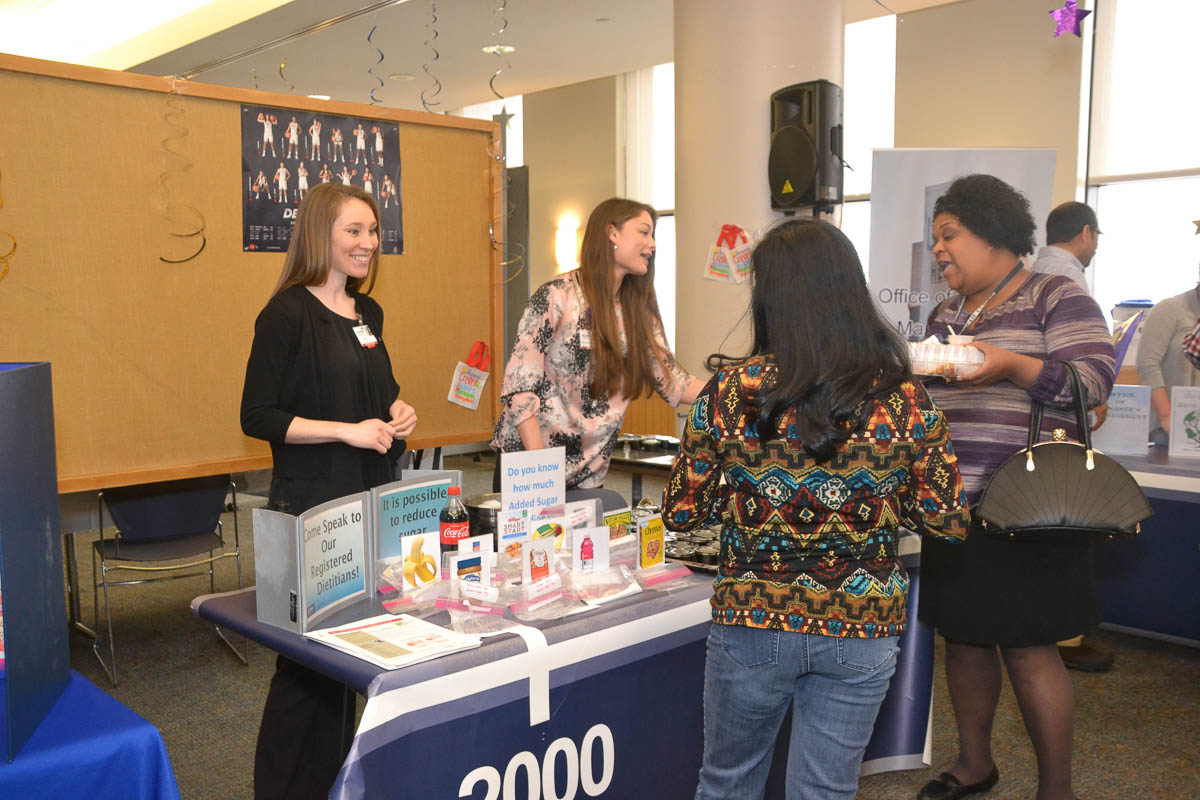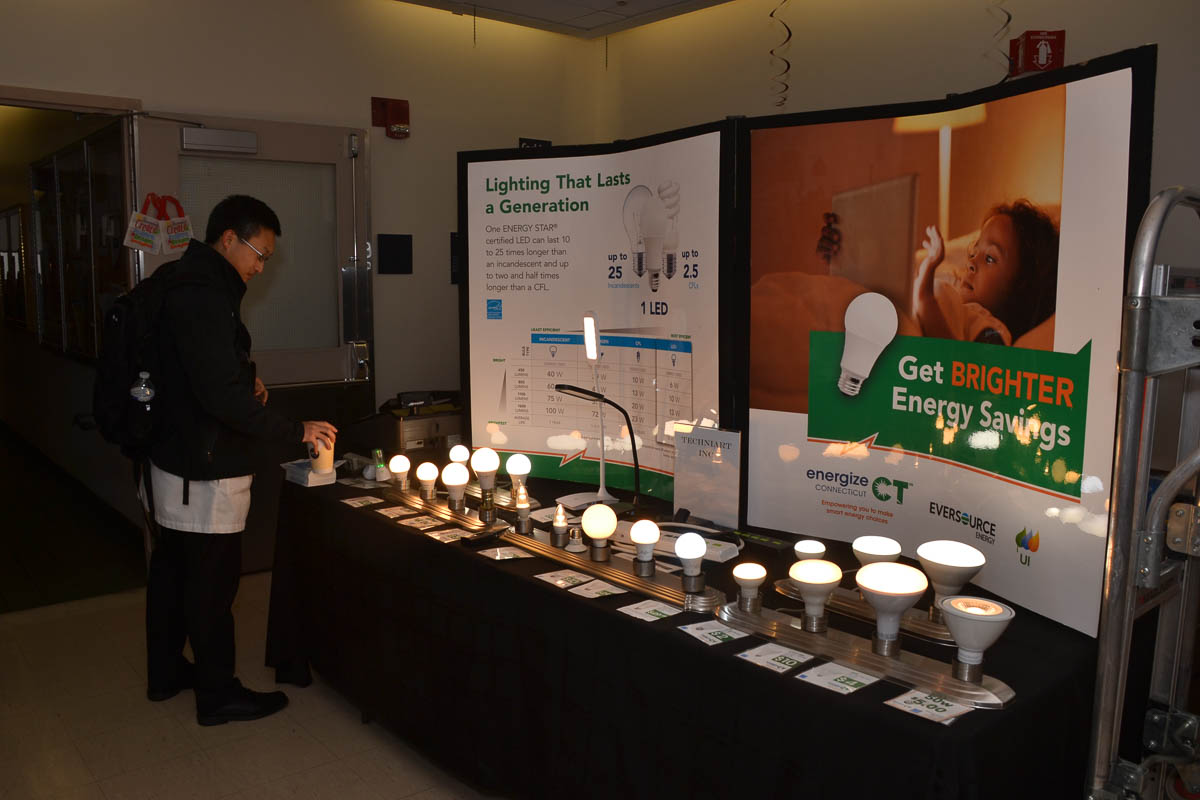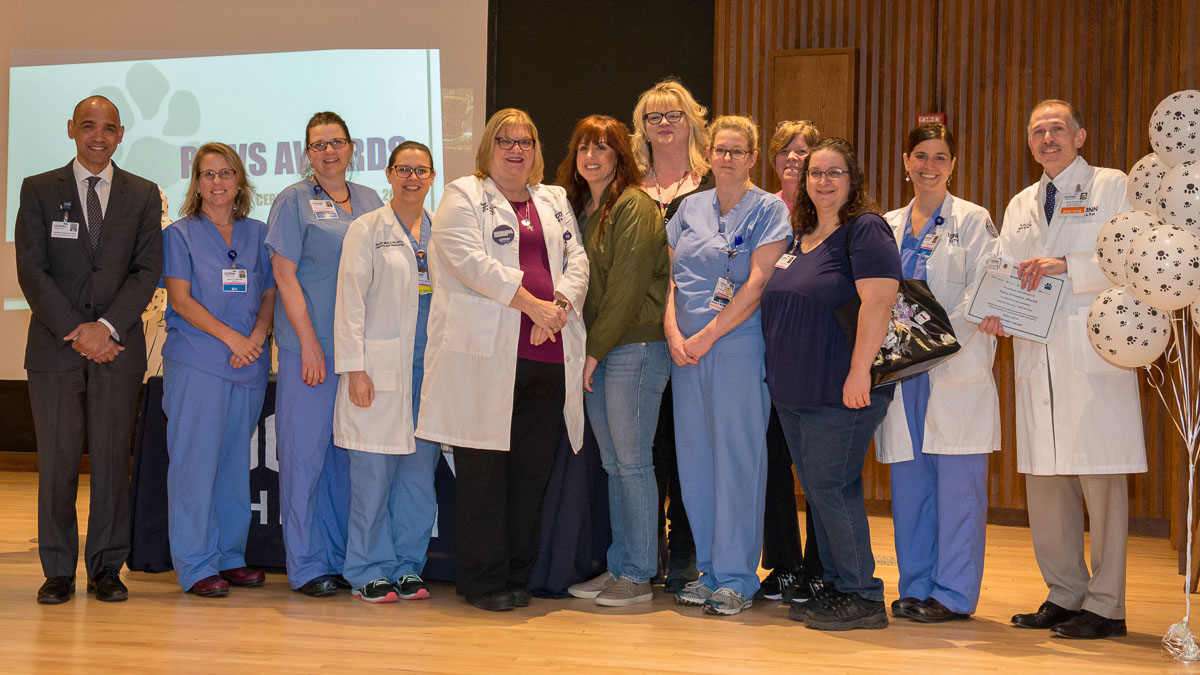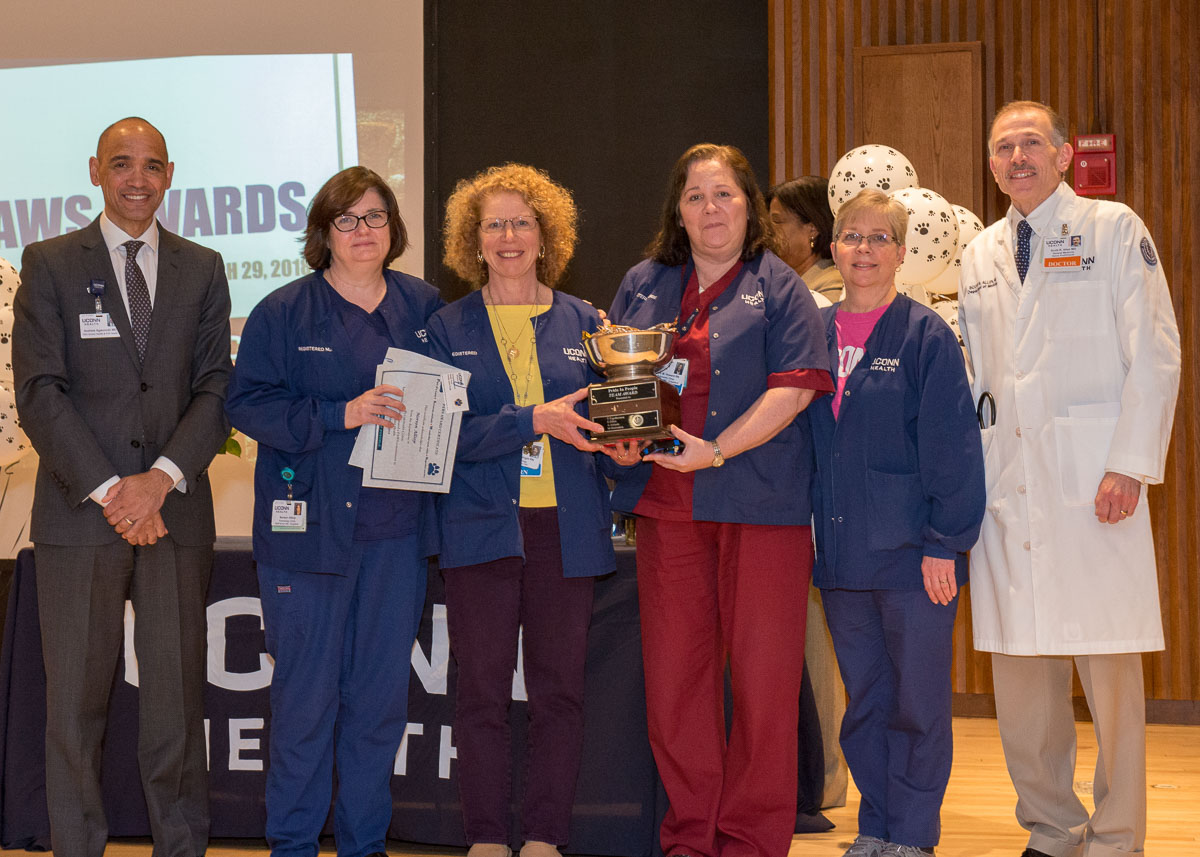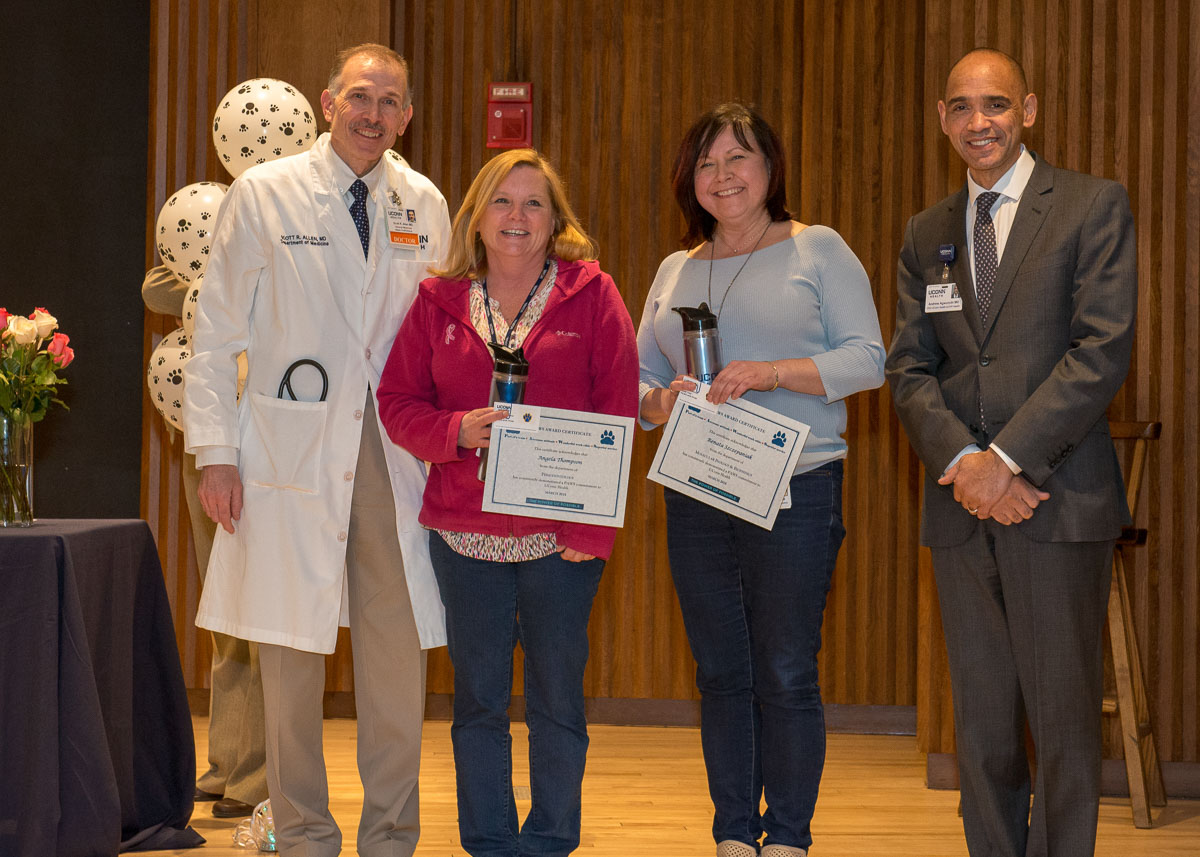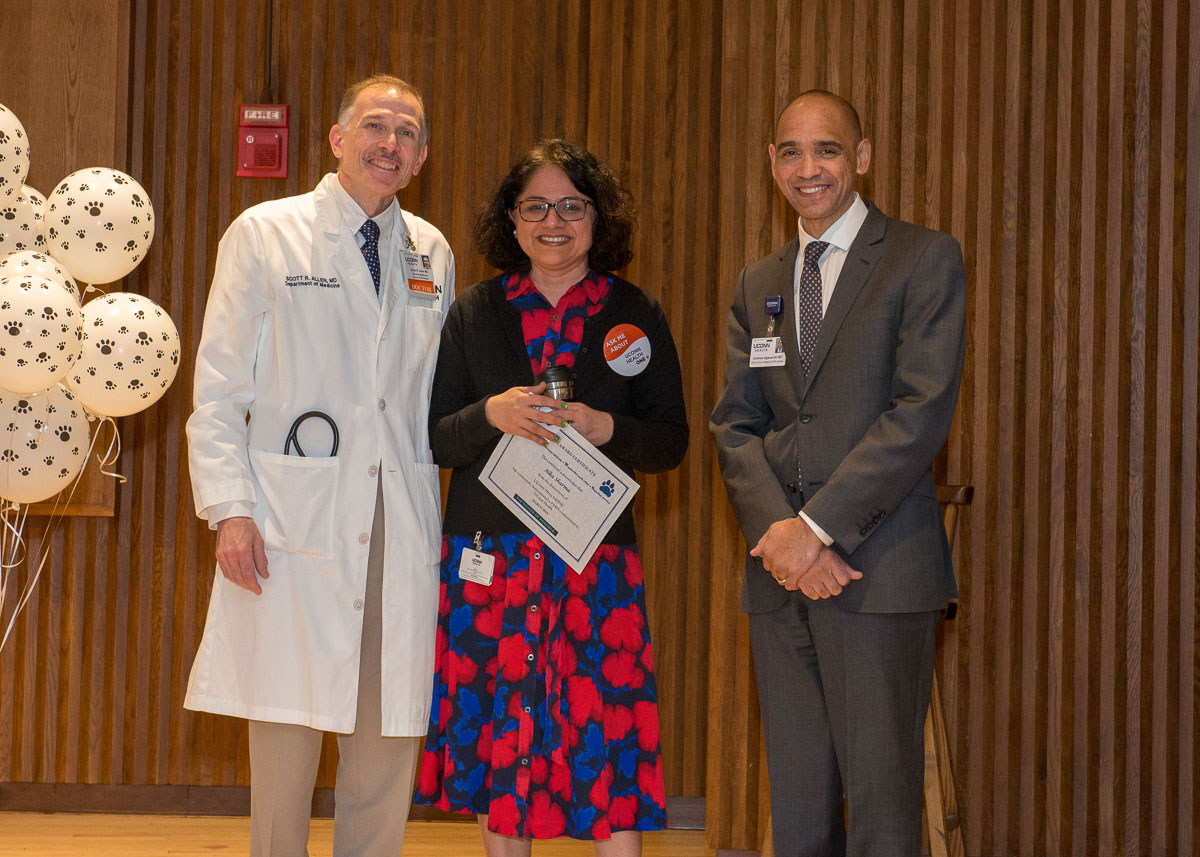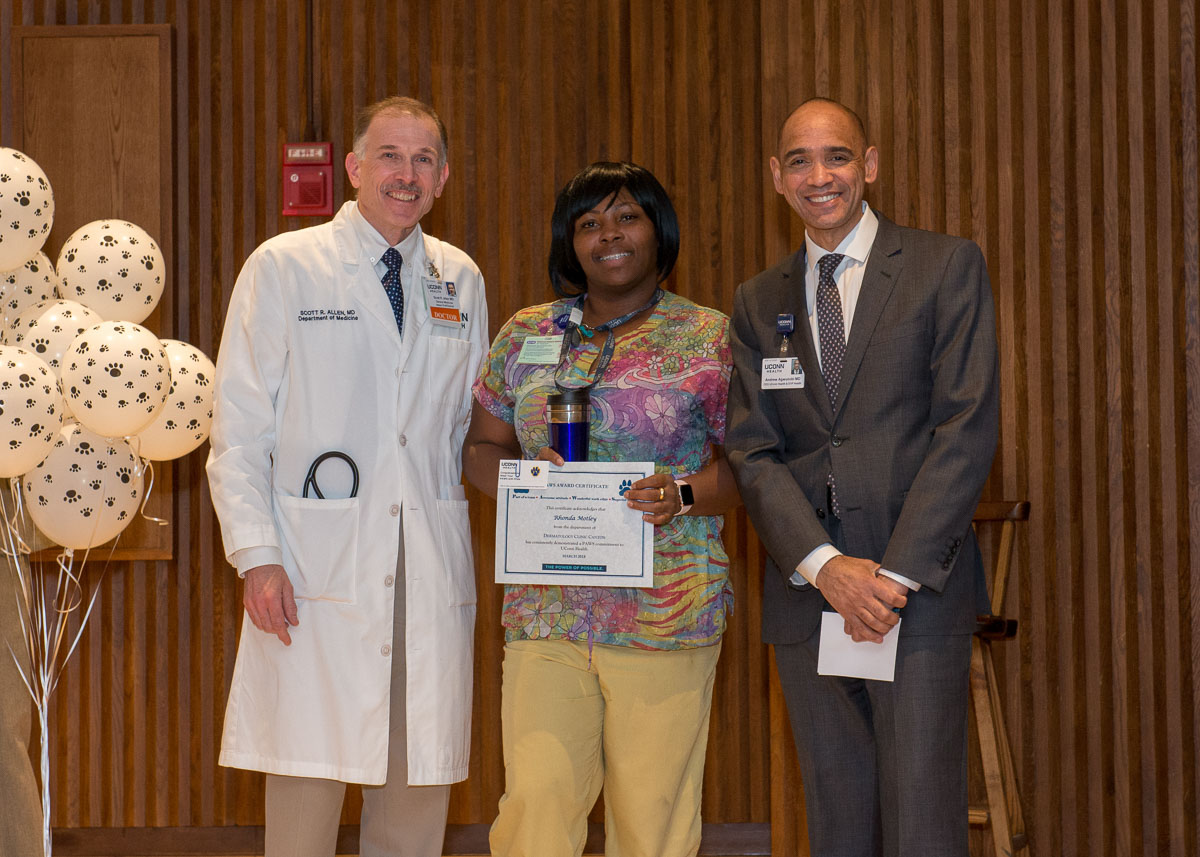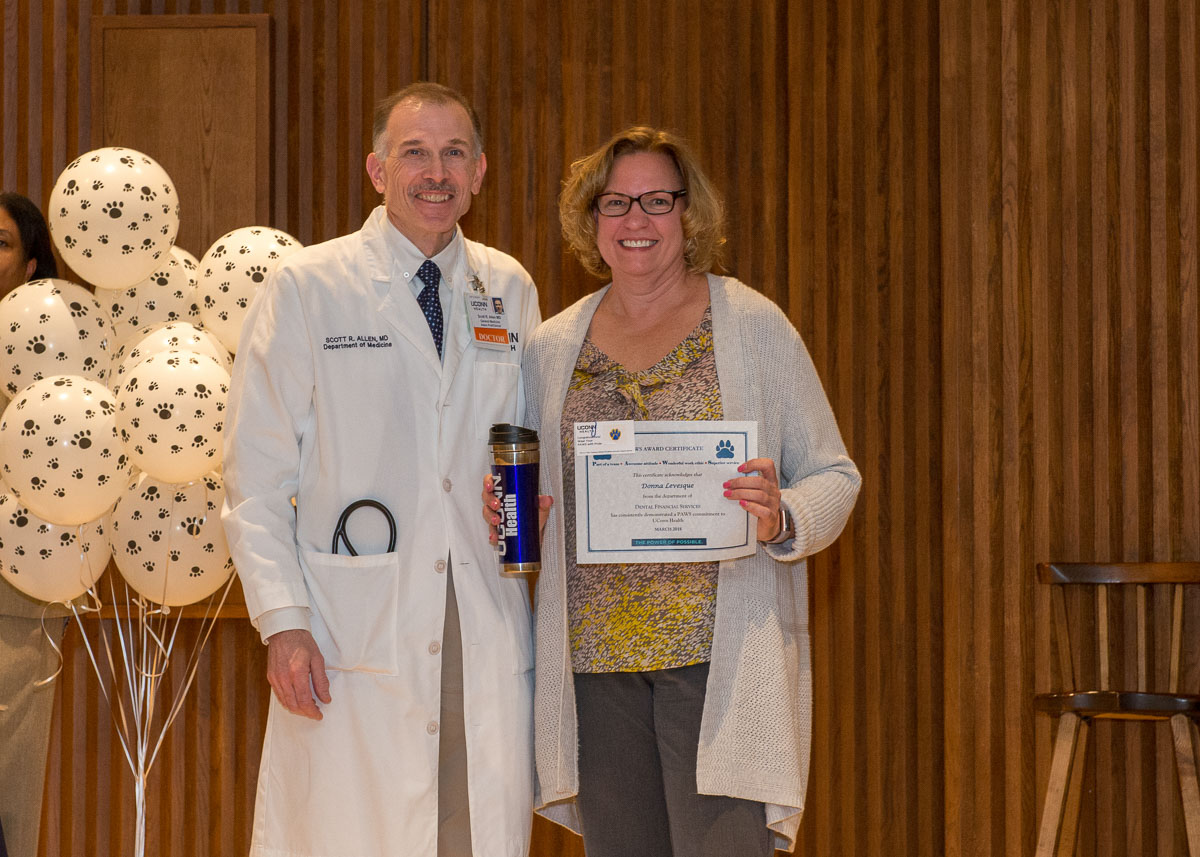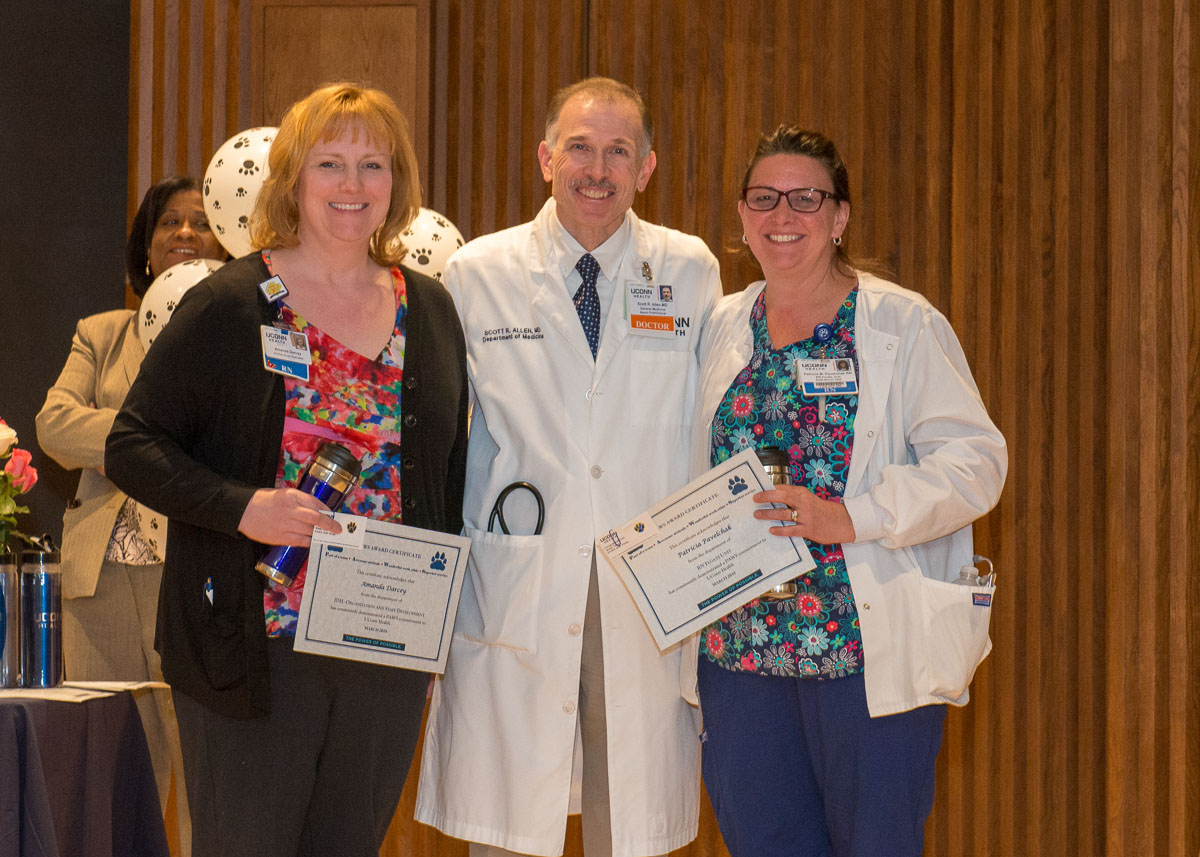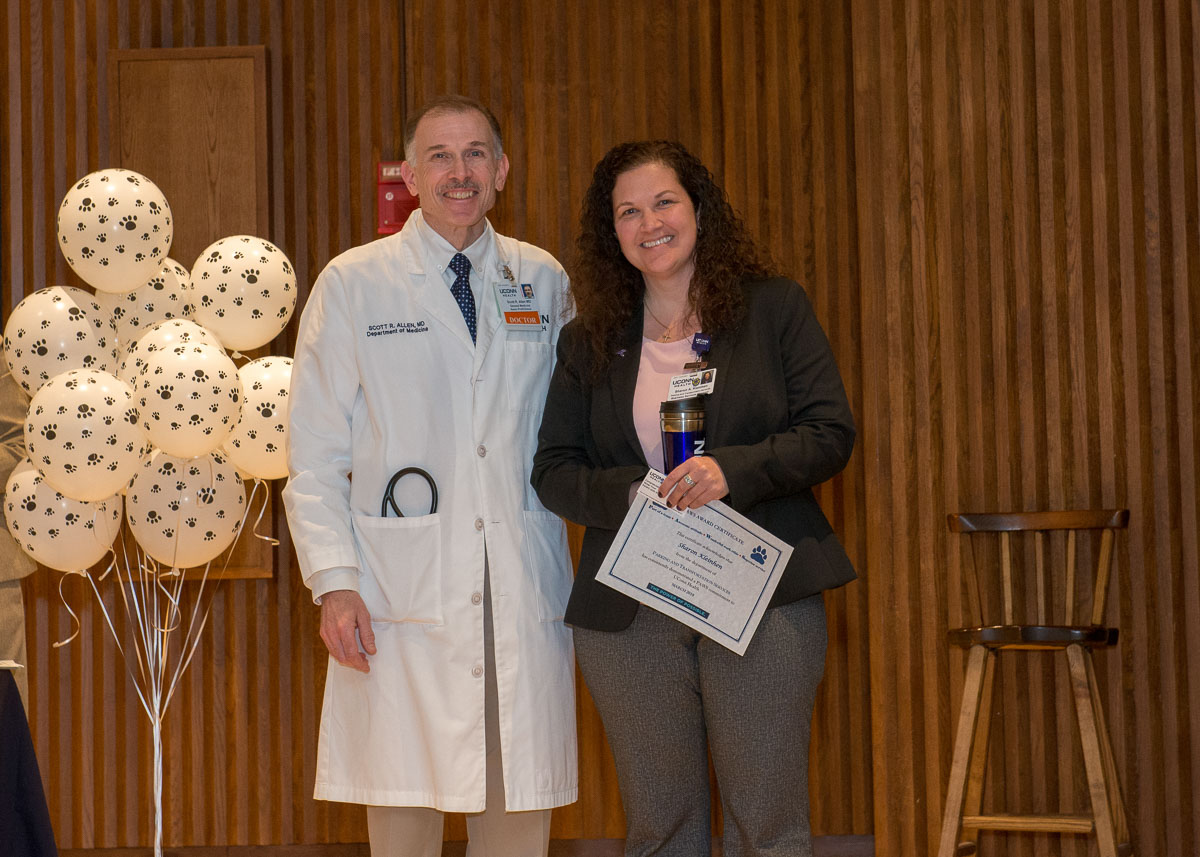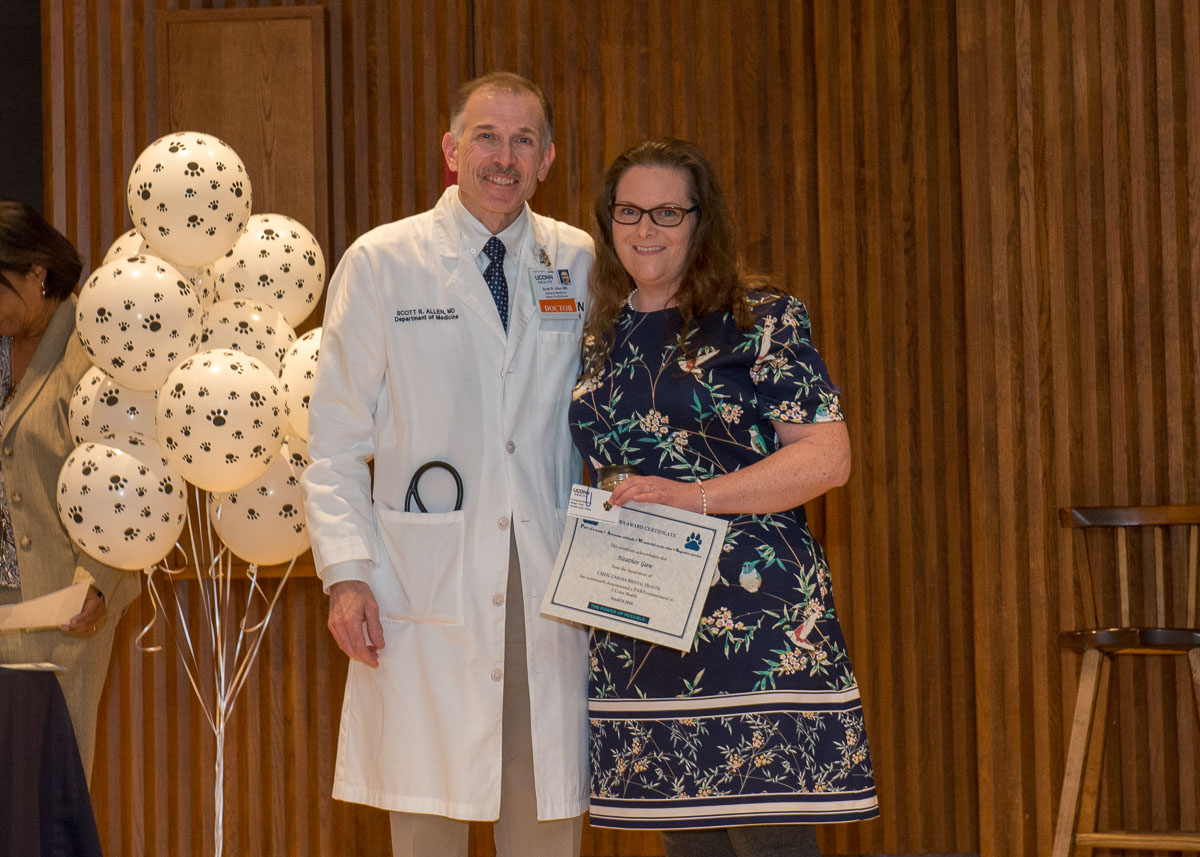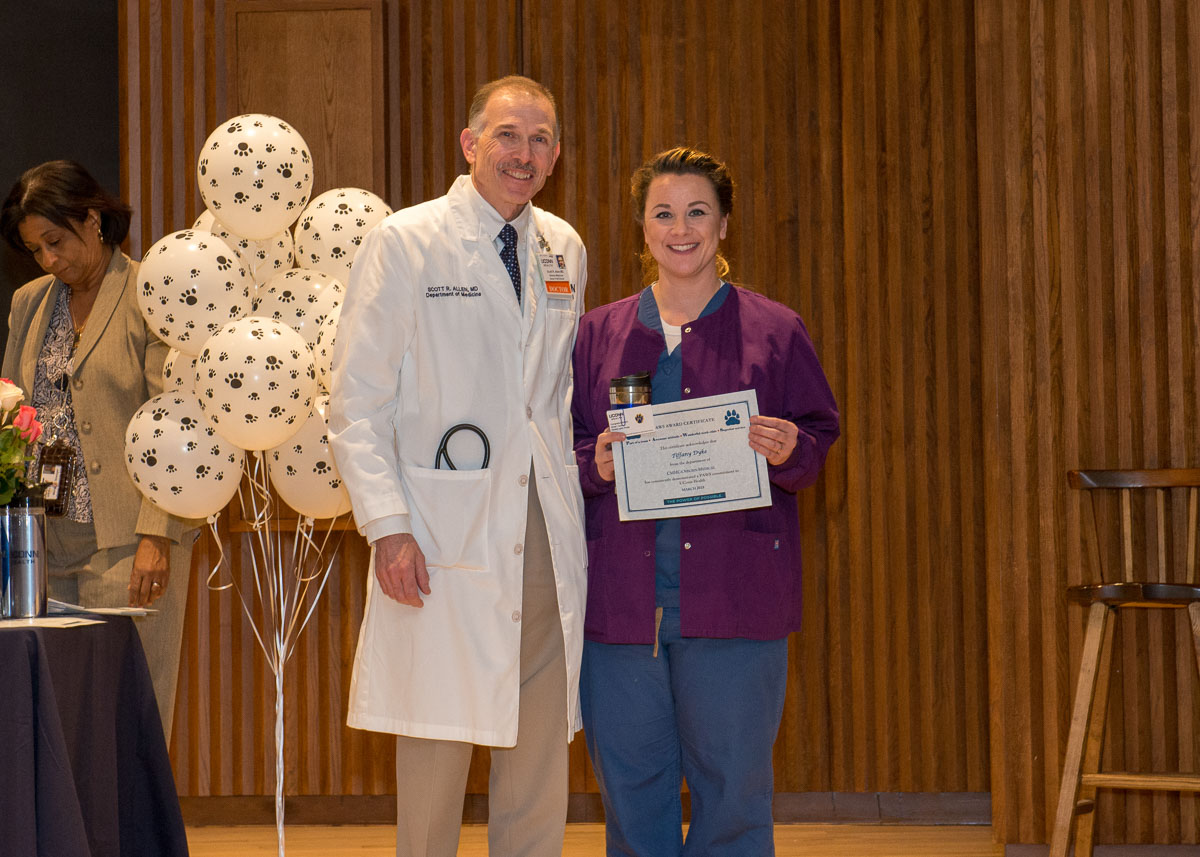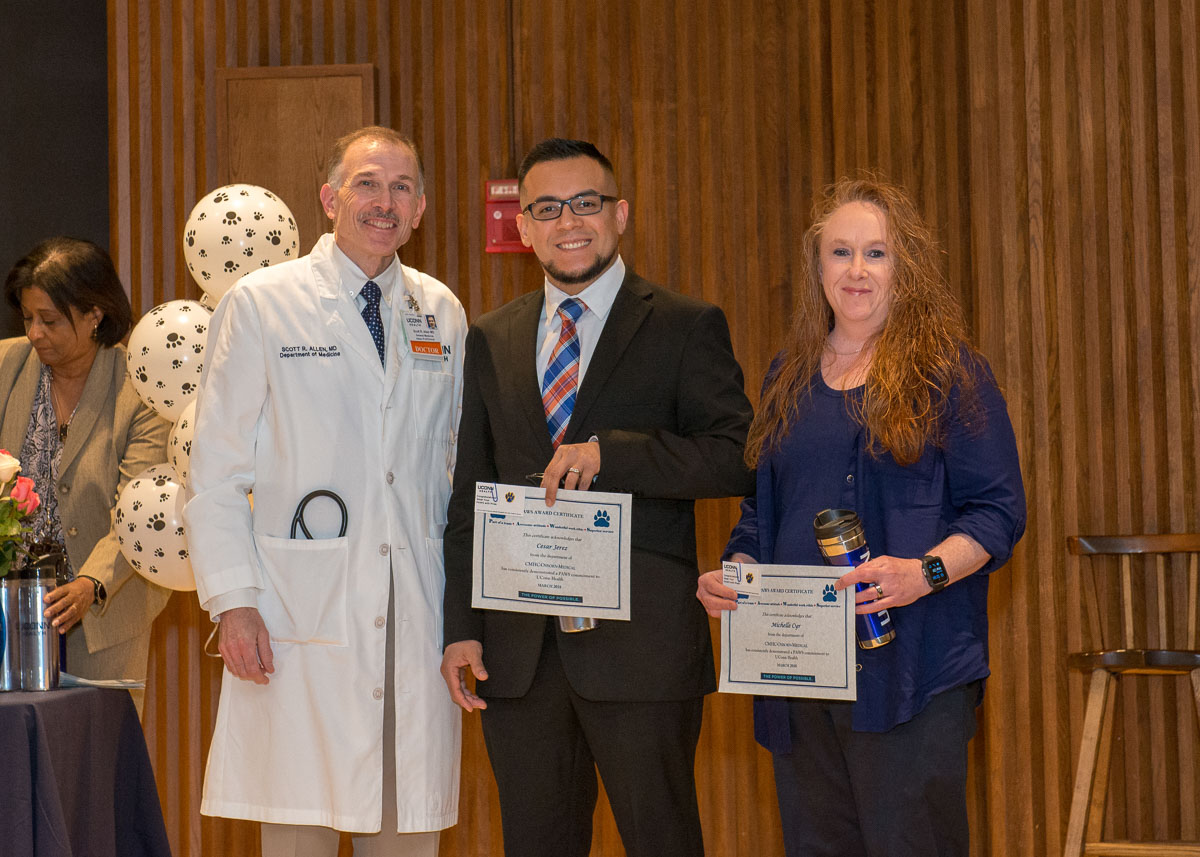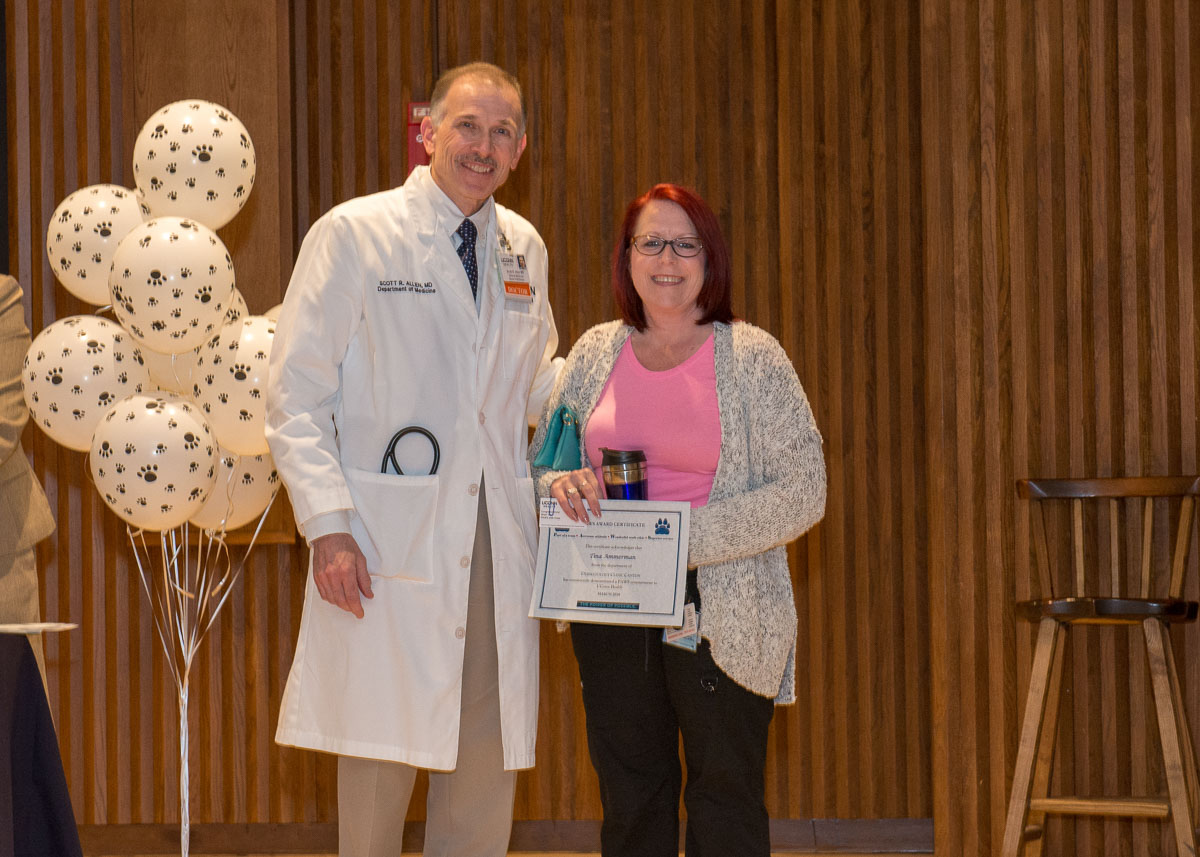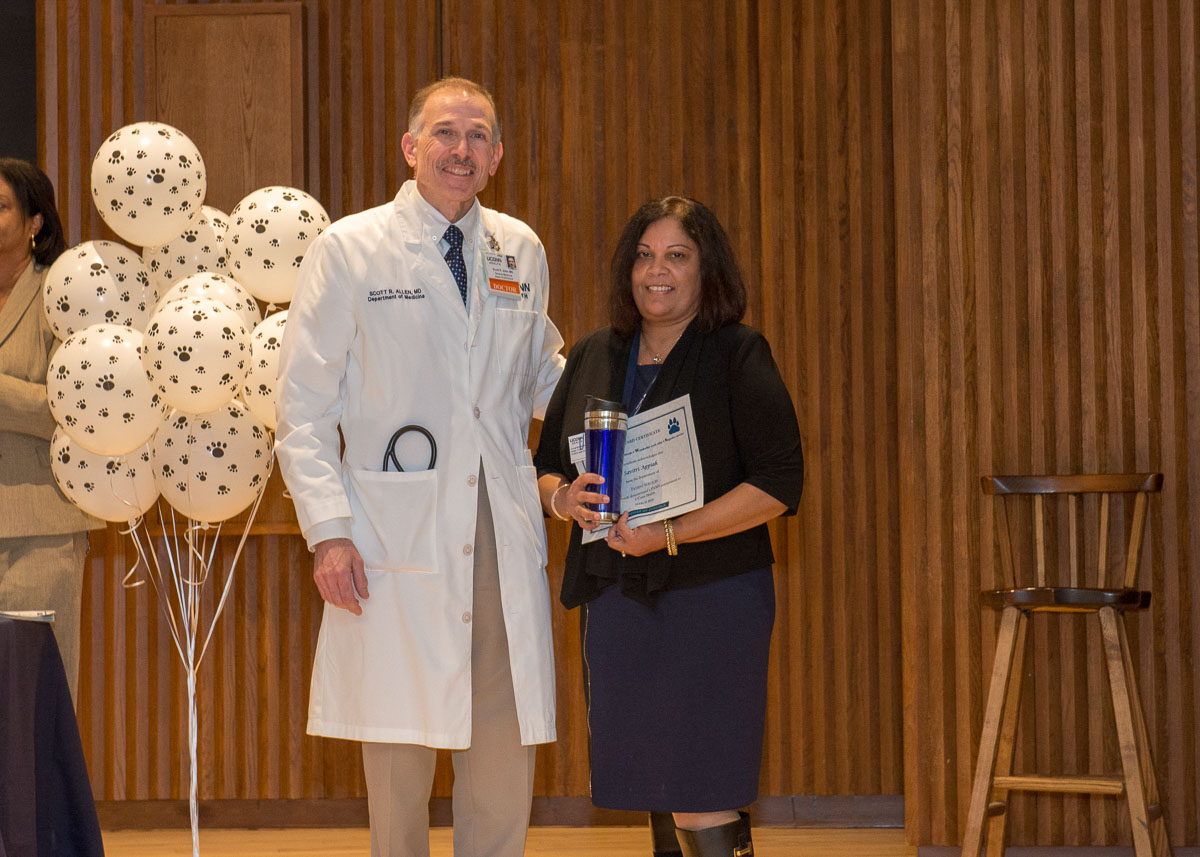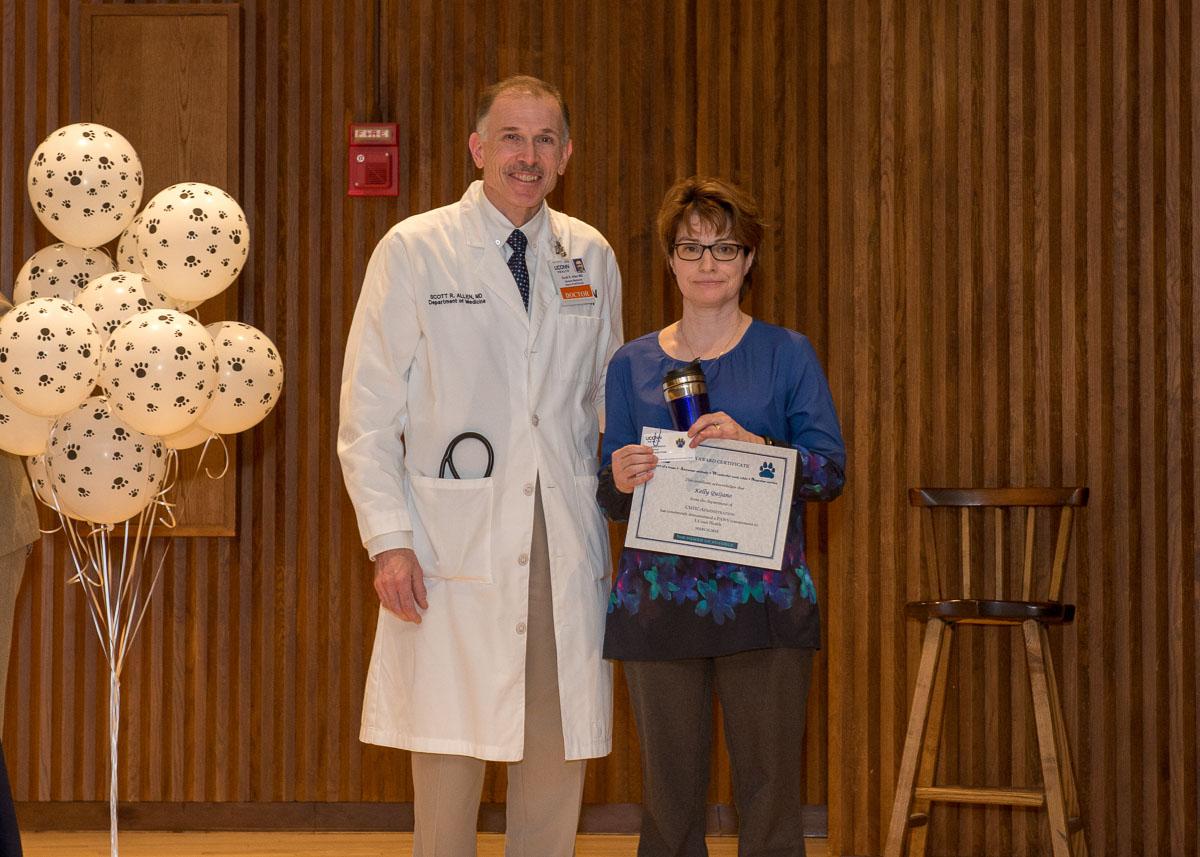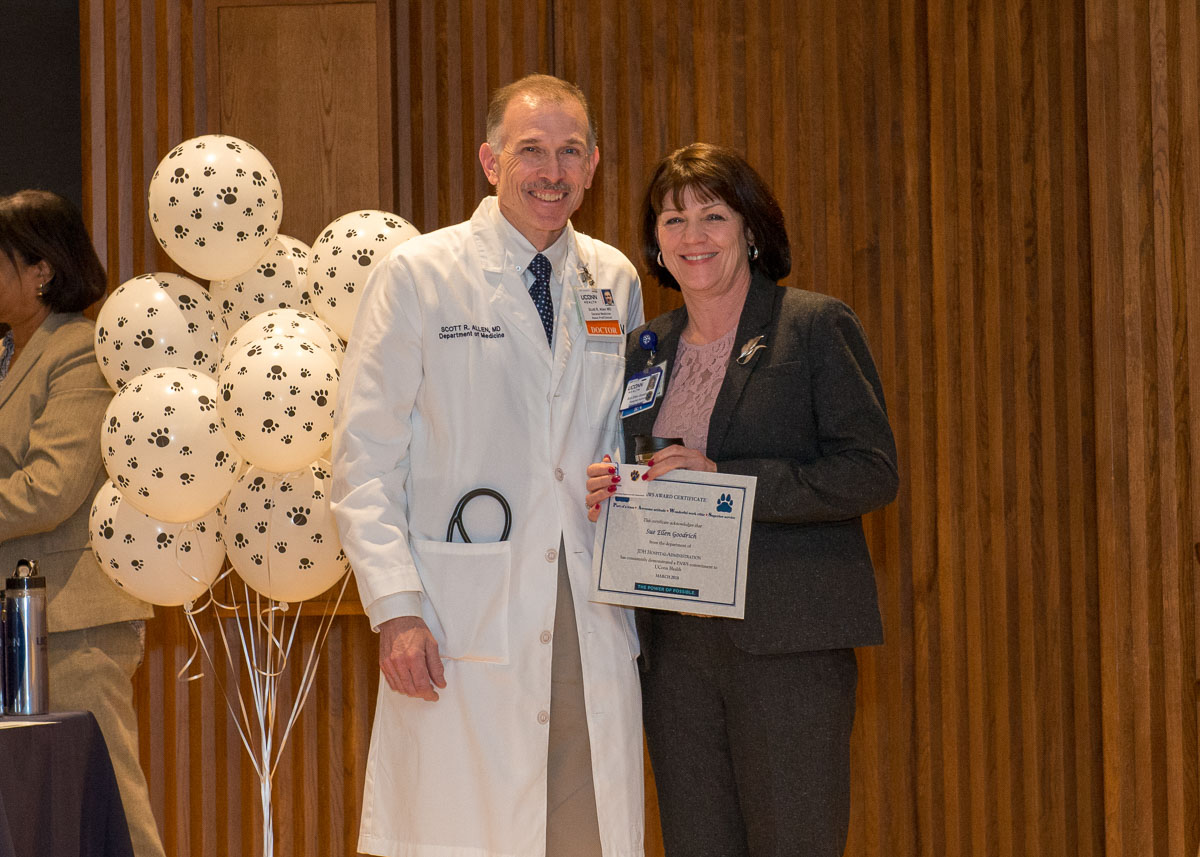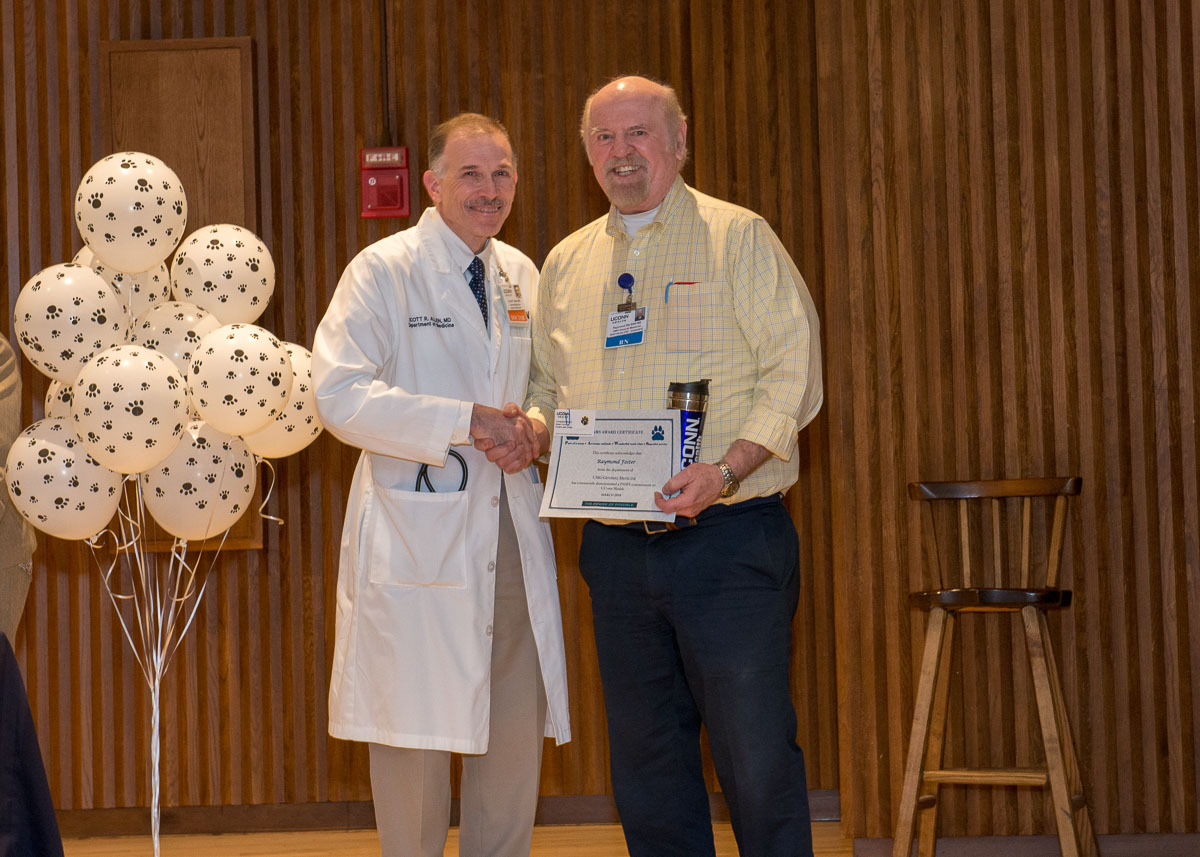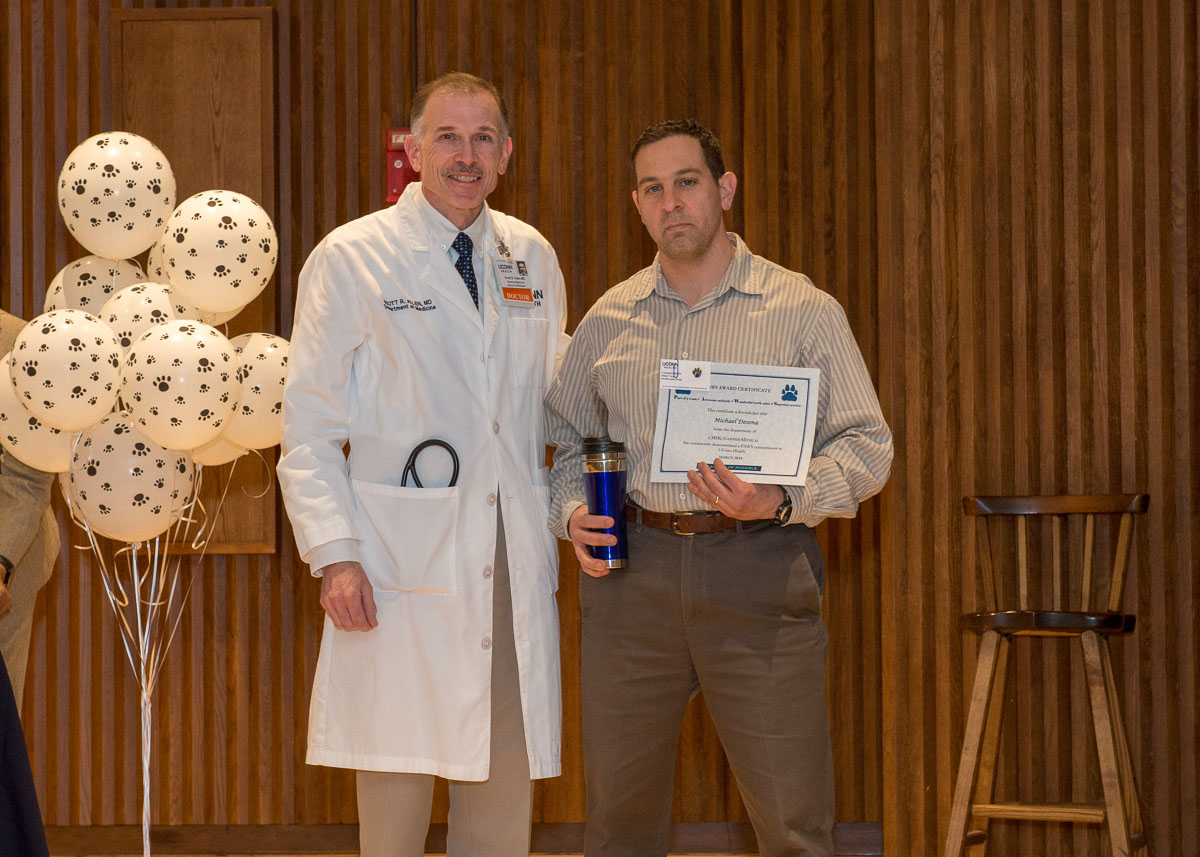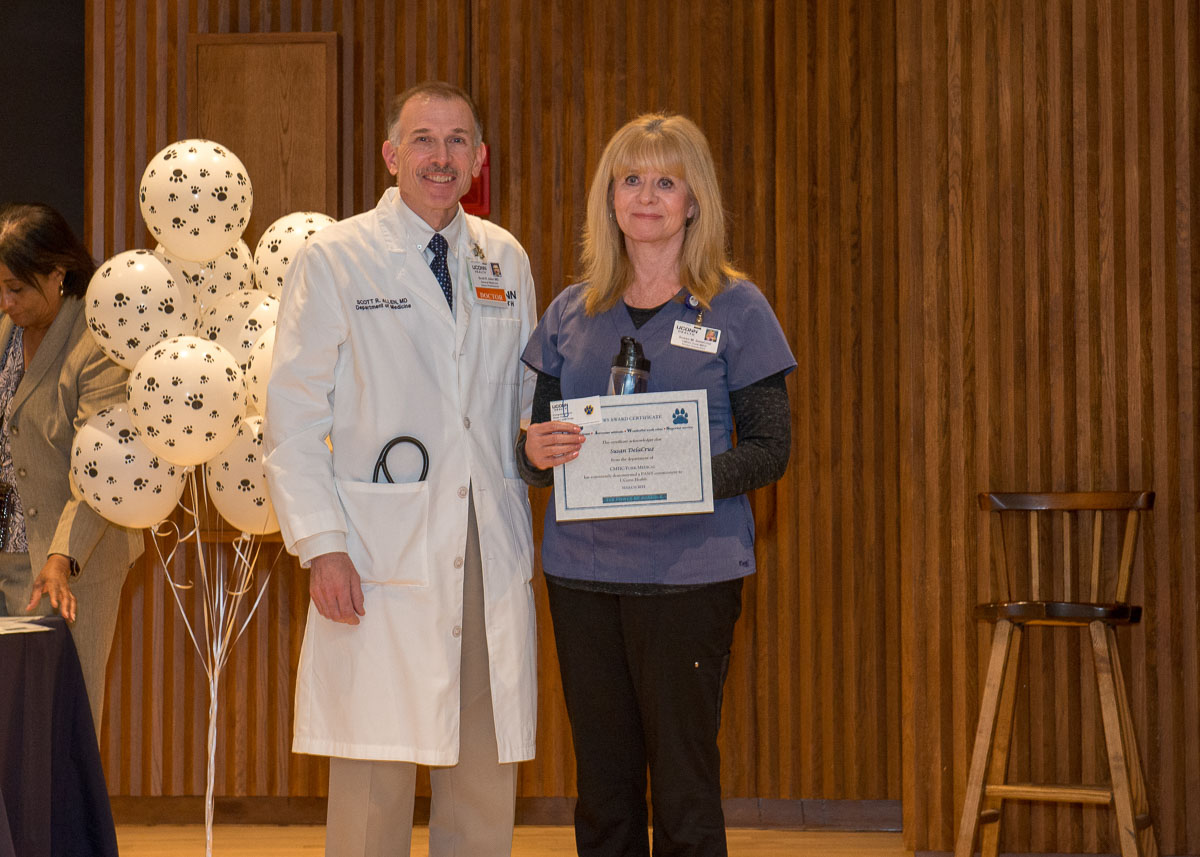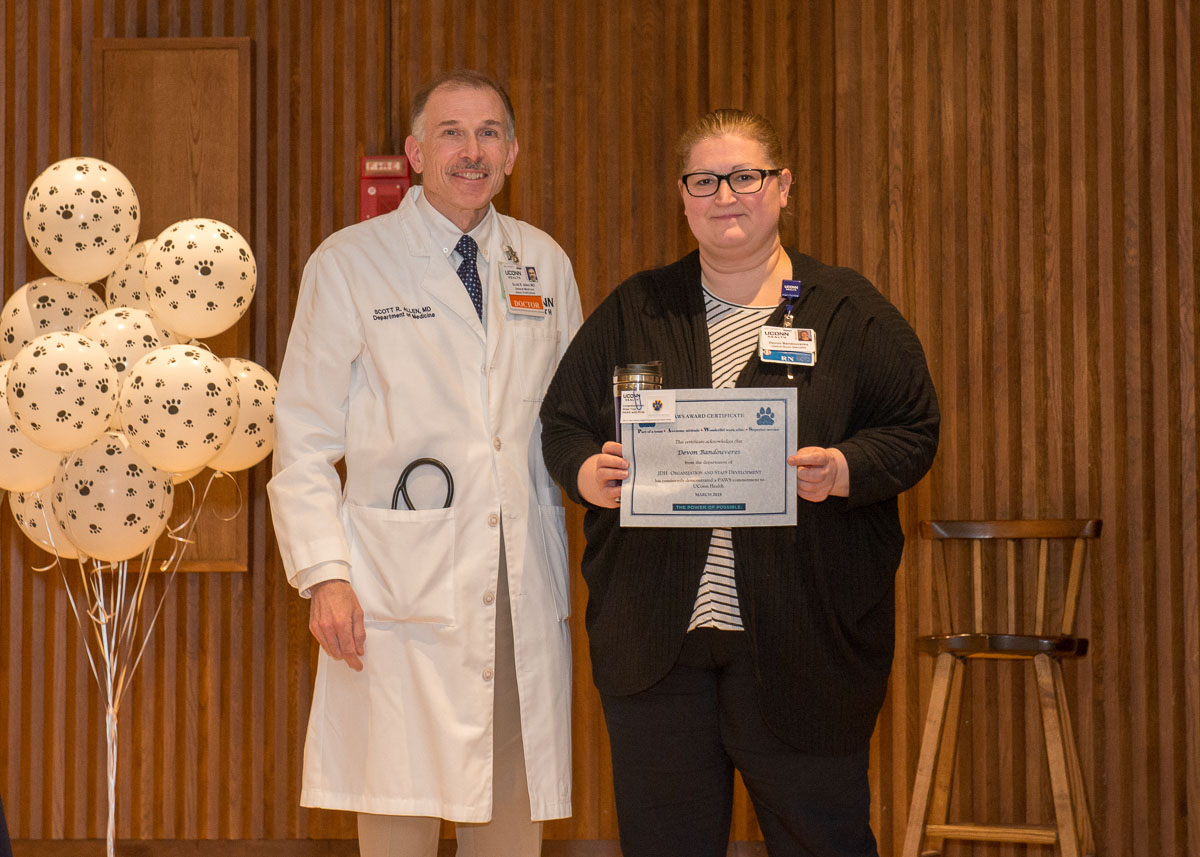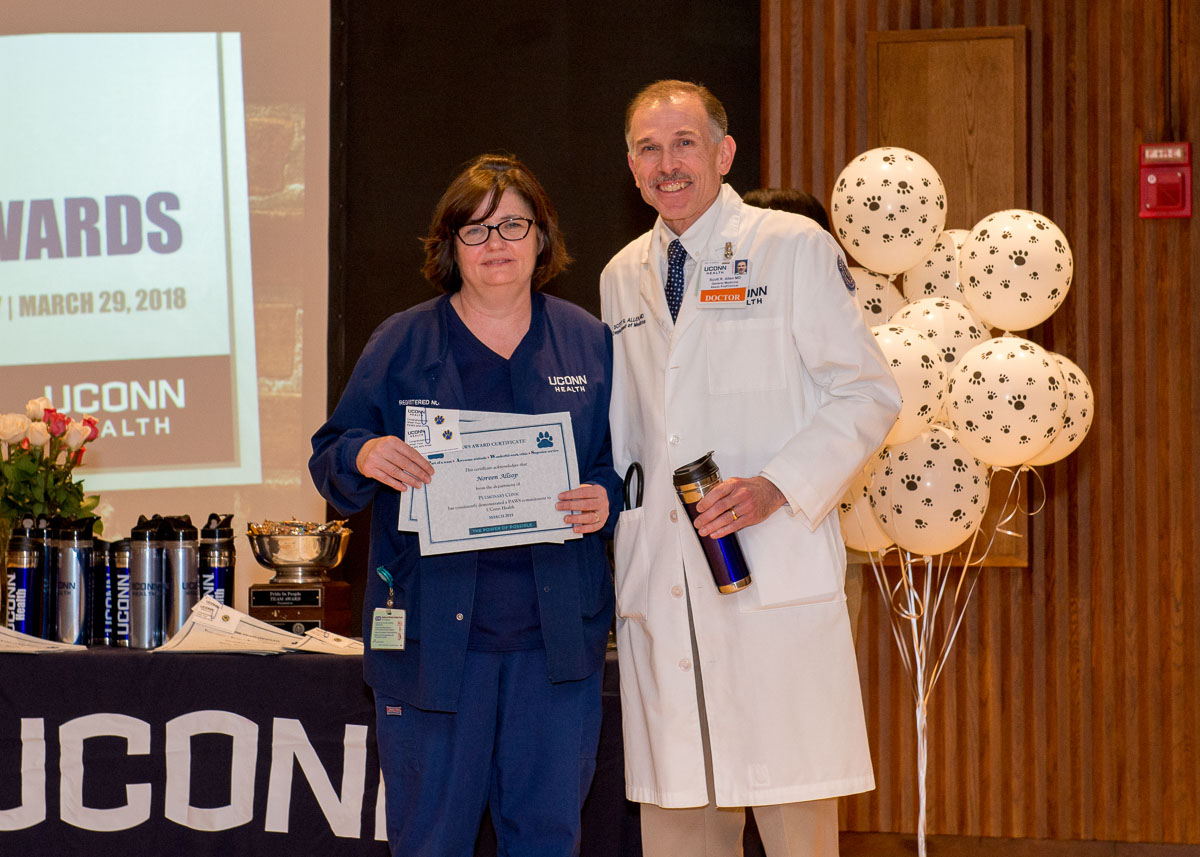In observance of National Volunteer Day and UConn Cares, UConn alumni gathered at the food court last Saturday to assemble blankets for patients at the Neag Comprehensive Cancer Center. They assembled 40 cozy fleece, no-sew blankets. It was organized by Josh Proulx from the alumni group and Liz Krueger from the UConn Foundation. Around 50 alumni volunteers and their families put together the blankets with short inspirational message cards tucked inside. Patient navigator Amber Tillinghast will distribute the blankets to patients, specifically breast cancer patients getting the Dignicap scalp-cooling treatment to reduce hair loss during chemotherapy.
Pulse
Are You a SmartShopper?
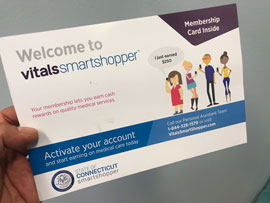 The state recently sent a brochure to your home touting a new feature available through the State of Connecticut health plan. The SmartShopper program helps you shop for cost-effective health care services while earning cash rewards. The Pulse wanted to learn more so we asked Human Resources Jessica VanAlstyne, director of employee benefits, and Christine Masotti, AVP of payer negotiations and network development, to answer a few questions about the program.
The state recently sent a brochure to your home touting a new feature available through the State of Connecticut health plan. The SmartShopper program helps you shop for cost-effective health care services while earning cash rewards. The Pulse wanted to learn more so we asked Human Resources Jessica VanAlstyne, director of employee benefits, and Christine Masotti, AVP of payer negotiations and network development, to answer a few questions about the program.
How does the program work?
This is a voluntary program that allows members (employees, retirees, and their enrolled dependents) to “shop” and earn cash rewards for utilizing low-cost providers for certain procedures.
Can all employees participate?
This program is available to all members enrolled in the State of Connecticut Employee Health Plan.
What is the benefit of being a member?
When you or your eligible dependents use this website or call center to shop for care in Connecticut for certain procedures included in the SmartShopper program, you can actually earn cash rewards as high as $500.
Why is the state offering this program?
This program was negotiated as part of the 2017 SEBAC Agreement in an effort to save money and improve health.
May I continue to use UConn Health for services/procedures?
Yes. Depending on the service, you and your dependents may not qualify for incentives by using UConn Health for certain procedures, however, it’s important to remember that it will not cost you or your dependents any more than it currently does to use our services.
What procedures are eligible for the rewards?
Inpatient
Back Surgery – Laminectomy $250 – $500
Bariatric Surgery – Laparoscopic Gastric Bypass $500 – $500
Hip Replacement $250 – $500
Hysterectomy $500 – $500
Knee Replacement $250 – $500
Spinal Fusion (Posterior) $500 – $500
Outpatient
Knee Arthroscopy with Cartilage Repair $75 – $250
Shoulder Arthroscopy $75 – $250
Shoulder Arthroscopy with Rotator Cuff Repair $75 – $250
Outpatient Diagnostic
Colonoscopy with Biopsy $75 – $250
Colonoscopy with Removal of Lesion(s) or polyp(s) $75 – $250
Screening Colonoscopy $75 – $250
Upper GI Endoscopy $75 – $250
Upper GI Endoscopy with Biopsy $75 – $250
How can I learn more?
Members can call a SmartShopper customer service expert at 1-800-824-9127 or e-mail at smartshoppersupport@vitals.com. Please include your name, phone number and a brief description of your question and you will be contacted as soon as possible.
A representative from Vitals SmartShopper will also be in attendance at the UConn Health Open Enrollment Fair on May 16 from 9 a.m. to 2 p.m. in the rear cafeteria.
Raymond Neag
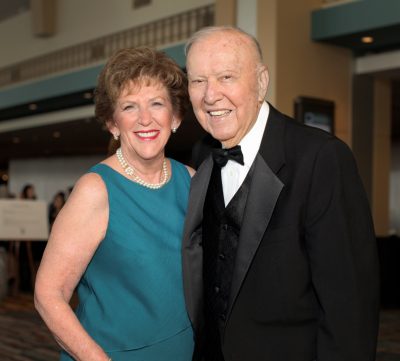 It is with the deepest sadness that we share news of the passing of Dr. Raymond Neag at the age of 86 on April 19.
It is with the deepest sadness that we share news of the passing of Dr. Raymond Neag at the age of 86 on April 19.
Dr. Neag, simply known to us as Ray, was a great man and a wonderful human being in every sense. Ray was an entrepreneur, industrialist, philanthropist and one of UConn Health’s most ardent and loyal supporters. Ray was a proud founder of Arrow International, well known for its triple lumen catheter benefiting patients in need of multiple intravenous therapies.
Ray inspired us with his humanity, which drove all his generous gift decisions. He gave so much of himself and his wealth to humanitarian causes for the betterment of society. His mother-in-law once told me that he is not the wealthiest person but he gave much more of what he had back to society.
Ray was the ultimate genuine true gentleman and the nicest person you will ever meet. He lived modestly and was like your friendly, next door neighbor. He was always positive even under the most difficult challenges. Despite great odds, he survived cancer and later faced cardiac and pulmonary diseases with the same courage, grace and positive attitude.
His big-hearted philanthropy to UConn Health supported the Carole and Ray Neag Cancer Center, Calhoun Cardiology Center, Orthopedics, Department of Radiology and Diagnostic Imaging, Radiation Oncology, Ophthalmology, Dermatology and many other causes.
UConn Health has lost a great friend in Ray, but will always remember and celebrate his successes and all the wonderful things he has done. We will always be reminded and inspired by his humanism, selflessness, dedication to helping others including those who are less fortunate, and his unfailing positive views on life, friendship, and family.
We send our heartfelt sympathy and condolences to Carole Neag, their children Elizabeth Lamoin and David Hogan, and the entire Neag family. He has left an indelible mark on UConn Health and his legacy will live on in the many centers, departments, programs and initiatives he has made possible.
Andrew Agwunobi, M.D., M.B.A.
Chief Executive Officer, UConn Health Executive Vice President for Health Affairs
Bruce T. Liang, M.D., F.A.C.C.
Dean, UConn School of Medicine
Director, Pat and Jim Calhoun Cardiology Center
Ray Neag Distinguished Professor of Cardiovascular Biology and Medicine
Health, Safety, and Environment Fair
The 15th annual Health, Safety and Environmental Fair was held on Friday, April 6 in the Main Building Food Court. This year’s theme was “The Power of Possible” and it featured a showcase of information, giveaways, and games from UConn Health departments and partnering vendors.
Hats Off to the Operators
Around the clock behind the scenes at UConn Health our telephone operators are handling an average of 2,100 phone calls a day during the week and an additional 700 daily calls on the weekend.
The team of 11 operators take shifts responding to a wide range of caller inquiries and supporting UConn Health’s communication needs. Operators direct general inquiries, employee calls, patient calls, staff pages, and after-hour on-call phone pages for all clinical practices including dental medicine.
Also, the telephone operators are responsible for pushing out the critical overhead and phone pages for prompt medical response for UConn John Dempsey Hospital staff to respond to time-sensitive, life emergencies such as Code Blues requiring a patient’s resuscitation and any stat anesthesia, obstetrics, or stroke patient need. In addition, they coordinate Voalte system messaging needs on the hospital floors.
“It’s important for everyone to appreciate the critical role the operators play in our institution’s operations,” stresses Dr. Scott Allen, interim chief quality officer for UConn John Dempsey Hospital. “We could not succeed without them.”
“Often times operators are the first contact someone may have with UConn Health, and those first impressions, are lasting impressions,” says Annette Karabin, UMG Call Center’s Training/Quality Assurance Coordinator. “The operators are a dedicated team that truly care about what they do.”
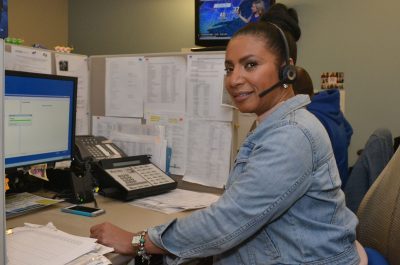
One of the many examples of the essential work of the operators on the frontlines is Pat Davis. Recently, the Patient Relations team received a telephone call from a UConn Health patient sharing his compliments about Pat and how she went above and beyond to help him.
“Excellent job, Pat, thank you for all that you do,” shared Karabin. “I often hear Pat on the phone when the caller is obviously anxious or upset. She has a very calm and reassuring demeanor with helping them.”
“Pat is very dedicated and thorough,” said Milissa Woodward, director of ambulatory access initiatives. “All of our operators are this good. They always get the job done.”
Woodward added: “Our group of operators are just incredible. I love working with them.”
Liisa Kuhn Named AIMBE Fellow
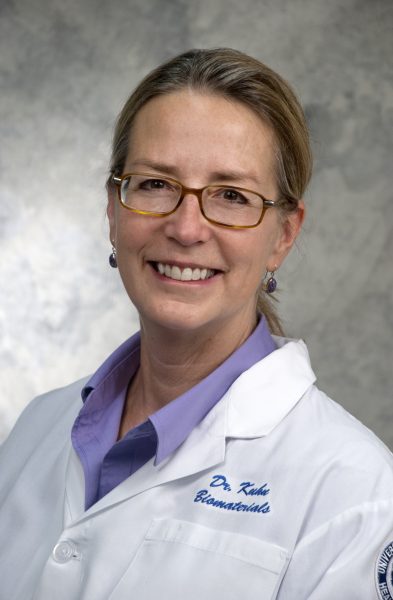
The American Institute for Medical and Biological Engineering (AIMBE) has announced the induction of Liisa Kuhn, Ph.D., associate professor of biomedical engineering at the UConn School of Dental Medicine to its College of Fellows. Kuhn was nominated, reviewed, and elected by peers and members of the College of Fellows for advancing the translation of bone biology and mechanics to its application in regenerative medicine. Election to the AIMBE College of Fellows is among the highest professional distinctions accorded to a medical and biological engineer. The College of Fellows is comprised of the top
two percent of medical and biological engineers. College membership honors those who have made outstanding contributions to “engineering and medicine research, practice, or education” and to “the pioneering of new and developing fields of technology, making major advancements in traditional fields of medical and biological engineering, or developing/implementing innovative approaches to bioengineering education.”
A formal induction ceremony was held during the AIMBE Annual Meeting at the National Academy of Sciences in Washington, D.C. on April 9. Dr. Kuhn was inducted along with 156 colleagues who make up the AIMBE College of Fellows Class of 2018.
Nia Harris Wins Inaugural Hartford Medical Society Research Award
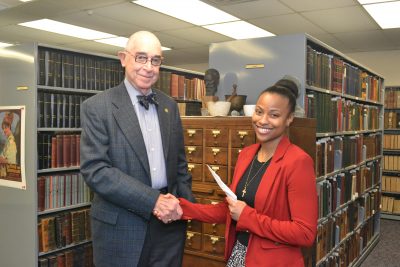
The Hartford Medical Society presented its inaugural award at the Medical and Dental Student Research Day 2018. Members of the Society from all over the world voted on the abstracts from eligible candidates with the last vote being cast from Zanzibar to select Nia Harris as the winner. Her project was “Filling the Therapeutic Void: Creating Guidelines for Developmental Trauma Disorder (DTD) through Film.” HMS members judged her project as the kind of research that helps doctors serving their communities, which is the purpose of the HMS award – to help advance community medicine.
Spotlight on Services: Colon Cancer Prevention Program
UConn Health started its Colon Cancer Prevention Program a decade ago. Dr. Joel Levine, one of the co-founders, describes how what started as a novel approach to the disease is becoming a mainstream concept.
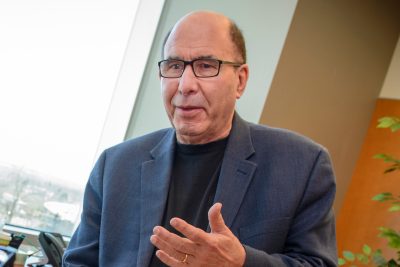
What makes the Colon Cancer Prevention Program successful?
The idea of prevention is what’s novel. There aren’t any other prevention programs that do what we do. If you Google “colon cancer prevention program,” we come out as the top listed patient centered resource.
Our process is very longitudinal. It’s not a one and done. We follow more than 6,000 people who return, at least annually, for both the latest information and for modulating their level of risk. Lowering risk is what we, the patient and Program, do. We are always learning how to do that more effectively. Indeed, we have not seen a colon cancer develop in someone who has been in the Program in about eight years. Put another way, if you come to us without colon cancer, we start by identifying risk and, then, follow you accordingly. If we reduce whatever risk level you have, we have not had a patient develop colon cancer on our watch.
The exceptions, so important to us, are patients who, on first visit, we find have colon cancer. Many patients are referred because of a positive FIT test (fecal immunochemical test). We introduced the quantitative FIT test to UConn Health and continue to study the test, over time, as an early marker for polyps or cancer. We work with the wonderful genetics group to identify those patients and families with inherited risk. Very few patients who have colon cancer in the family have actual inheritable risk (3 percent) but they are important to identify. These patients are followed closely, expecting them to develop colon cancer as a risk of their disease. We cannot as of yet prevent it in those inherited risk families, but we still can take steps to reduce risk by about half.
Prevention chose our program to feature in its “Guide to Preventing Disease” in its April issue. What do you see as the implications of that?
This is one of the largest magazine readerships in the world. The increasing recognition of a program dedicated to prevention is encouraging. Therefore we are at the tip of that spear and grateful to the Neag Comprehensive Cancer Center for supporting us from the outset.
We have a program whose purpose is to think about the disease. We are migrating from just doing colonoscopy, which is still important, to what do you do before and after the colonoscopy—how you define risk and how you then modulate the risk—and that’s prevention. In recent conversations with Dr. Dorado Brooks, who leads the colon cancer division of the national American Cancer Society, we plan to forward this more broad-based and lifelong strategy to lower the frequency and mortality of this disease. The evidence is emerging and our approach that combines the latest in scientific thought to patient care is shaping how we see the problem and solution.
What’s happening on the academic side?
We are publishing and hoping to influence thought. I just co-wrote an editorial for a leading GI journal with Dr. Joseph Anderson [former UConn Health colleague, now at Dartmouth] in which we discuss a particular type of colon cancer pathway. The emphasis is on how long it takes for that pathway to go from one level of risk to another. Young people can have polyps in that pathway but do not commonly develop colon cancer; it is only when they are much older do you see the colon cancers appear, so you have a long period of time in which the disease evolves. There are even specific risks, because this pathway involves DNA methylation, a biologic process that can silence key genes. This occurs progressively as you get older but can be increased cigarette smoking, a behavior we really fuss about. Dr. Anderson’s study of smoking risk, begun here, is very well recognized and regarded.
How has the approach to mitigating colon cancer prevention evolved over the program’s 10 years?
It’s really colonoscopy-plus, with super-sensitive blood stool testing, better understanding of the colon’s microbiome, and an ever-growing knowledge of modifiable risk factors. In this regard, Dr. Ethan Bortniker, who directs new approaches in clinical research, studies how other lifestyle factors (cardiovascular health, metabolic fat in the liver) influence colon polyps and cancer. Our patients know this and are proactive participants in their own well-being. They fastidiously stick with the program.
Overall the colon cancer attack rate is still low. If you have a 5 percent attack rate in a disease, your anxiety says, “Show me I don’t have the disease.” We hope to focus more on those who are likely the 5 percent. Early prediction of biologic and then clinical risk is the name of the game. Dr. Dan Rosenberg, who is the director of our basic research, is a leading authority and invaluable to our clinical approach. We hope to be able to understand the biology of early cancer risk and keep it from becoming a clinical reality. So far, we are making progress.
PAWS Award Winners Spring 2018
Eighty-nine exceptional UConn Health employees were honored at the spring PAWS ceremony in Keller Auditorium Thursday. The employees were recognized for exhibiting the following qualities: being Part of a team, an Awesome attitude, a Wonderful Work Ethic, and Superior Service. In addition to the individual awards, two TEAM awards were also highlighted. Prior to recognizing each of the honorees, UConn Health CEO and Executive Vice President for Health Affairs, Dr. Andy Agwunobi welcomed and thanked them for their commitment and dedication which is deeply rooted in the overall success of our organization.
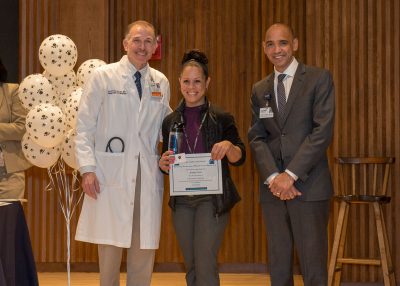
Among those recognized was an unsung hero Brenda Ortiz, a clinical office assistant in our General Medicine clinic. A patient, who has been coming to UConn Health for years, requested that Brenda be recognized for her outstanding service. The patient stated that Brenda always treats him like family. Every time he comes to UConn Health, Brenda offers him a big smile and greets him by name. He went on to say that he has seen her interact with other patients in the same manner, consistently. He is sure that she must have a bad day from time to time but it never affects her relationship with her patients. Brenda’s supervisor also noted that Brenda recently has started encouraging other employees to lead healthy lives by walking and exercising with them during lunch using our gym. Every day, Brenda focuses on making someone’s life better.
Here’s a complete list of the honorees:
Savitri Appiah…………………………………………………….. Patient Services
Noreen Allsop…………………………………………………….. Pulmonary Clinic
Tina Ammerman…………………………………………………. Dermatology Clinic – Canton
Michelle Cyr……………………………………………………….. CMHC – Osborn Medical
Tiffany Dyke………………………………………………………. CMHC – Osborn Medical
Patricia Fagan…………………………………………………….. Cardiac Cath. Lab
Heather Gaw……………………………………………………… CMHC – Osborn Medical
Aaron Greenblatt………………………………………………… Customer Service Support
Cesar Jerez………………………………………………………… CMHC – Osborn Medical
Sharon Kleinhen…………………………………………………. Parking & Transportation Services
Patricia Pavelchak……………………………………………….. RN Float Unit
Amanda Darcey………………………………………………….. JDH – Organization & Staff Development
Arlene Morin………………………………………………………. JDH – Organization & Staff Development
Donna Levesque…………………………………………………. Dental Financial Services
Rhonda Motley…………………………………………………… Dermatology Clinic – Canton
Brenda Ortiz………………………………………………………. UMG – General Medicine
Jessica Santos-Martinez……………………………………….. Neag Cancer Center Unit
Alka Sharma………………………………………………………. UConn HealthONE
Renata Szczepaniak…………………………………………….. Molecular Biology & Biophysics
Angela Thompson………………………………………………. Periodontology
NIGHTINGALES
Noreen Allsop…………………………………………………….. Pulmonary Clinic
Devon Bandouveres……………………………………………. JDH – Organization and Staff Development
Diana Campbell………………………………………………….. CMHC-Hartford-MED
Susan M. DelaCruz………………………………………………. CMHC-York-MED
Michael C. Desena………………………………………………. CMHC-Garner-MED
Diane Flanigan……………………………………………………. Clinical Nursing Units
Raymond Foster…………………………………………………. UMG-General Medicine
Sue Ellen Goodrich………………………………………………. Hospital-Admin
Kelly A. Quijano………………………………………………….. CMHC-Administration
TEAMS
Pulmonary Medicine Outpatient Nurse Team
Noreen Allsop Jilly Kelly Annette Wright
Grace Howard Joan Sellek Mary-Margaret Taylor
Labor & Delivery, OB/GYN Team
Patty DosSantos Almeida Carrie Ferrindino Jessica Pena
Robin Anderson Diane Fillion Jessica Perkins
Michelle Baker Lina Godfrey Karen Piazza
Christine Biolo Rocio Goyzueta Lauren Piro
Irene Bonati Sarah Hill Jacki Pond
Patricia Bowen Laura Jaggon Millicent Reynolds
Maryanne Calderoni Deb Junkins Doreen Rinaldo
Karen Callahan Suzanne Karelus Lauren Rocco
Jenny Caroon Danielle Kinney Jenny Serrambama
Marianne Chapman Joanna Kuszaj Danielle Shweky
Jen Charette Toni Leers Valerie Sokoloski
Melanie Cherubino Eileen Lopez Deb Stelick
Joann Cipriano Susan MacDonell Teri Stratton
Crose. Amy AnnMarie Marolda Courtney Tobin
Tara Distasio Karin McCormick Kimberly Tripputi
Mia DiTamasso Marisa A. Merlo Kathy Whitehead
Becky Fang Heather Messier Nicole Worrell
Kristen Festa Diane Morgan
UConn Health Hosts State Contest for Junior Scientists
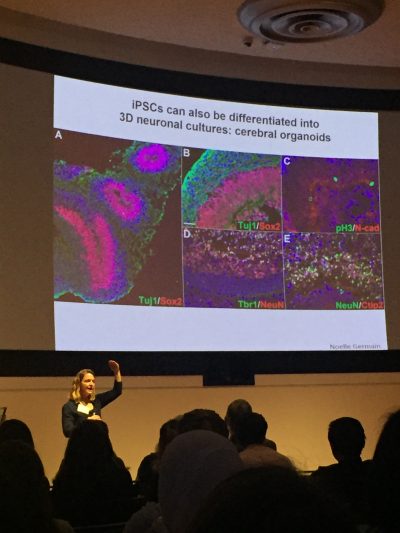
By Biomedical Sciences Ph.D. candidate Brittany Knight and JSHS event organizer
For the second year in a row, UConn Health hosted the statewide competition of the Junior Science and Humanities Symposium (JSHS). This year around 200 students, teachers, and parents representing 40 schools took part in the all-day conference. It’s designed to provide high schools students with a forum to share ideas about how to solve real world problems with STEM education. STEM stands for science, technology, engineering, and mathematics which are all essential to the future of our technology-driven world.
In preparation for the competition, students submitted research proposals several months in advance that recognized a significant problem pertaining to human affairs. About 80 proposals were then rated by a panel of professionals in STEM science to be presented as oral or poster presentations. Needless to say, the scientific merit and rigor that went into these projects exceeded expectations and it was challenging to decide which projects were to be a part of the competition.
The symposium included a keynote presentation by Stormy Chamberlain, an associate professor in genetics and associate director of the Genetics and Developmental Biology Graduate Program at UConn Health. Her talk focused on her research using induced pluripotent stem cells (iPSCs) from patients with Angelman syndrome, Prader-willi syndrome, and 15q duplication syndrome.
Following the keynote, students were divided into groups to present or attend the poster and oral presentations. Students were also given the opportunity to attend a career panel session with young professionals in social work, nursing, pharmaceutical science, medical science, research, public health, and dentistry. Students asked the panel questions pertaining to career motivations, challenges with career decisions, college or high school course preparation, internships, college planning, loans, etc.
Another option for students was touring some of our research labs, including the virtual anatomy lab, to participate in hands-on activities and learn about the exciting research being done here. Graduate students in the Biomedical Sciences Ph.D. program, including Matthew Sticco (Neuroscience), Nicholas Wasko (Immunology), Rajamani Selvam (Neuroscience), and Shubham Khetan (Genetics) led the tours. They each created a short module that consisted of hands-on activities as well as career advice for students interested in pursuing a career in research.
At the end of the event, top presentations were announced. The effort and scientific merit that went into this year’s projects was nothing short of amazing. It’s important to note that last year’s first place national winner was one of Connecticut’s JSHS winners last March.
JSHS is nationally organized by the Academy of Applied Sciences with sponsorship from the U.S. Army, Naval, and Air Force. Connecticut’s program would not have been made possible without the dedication of Connecticut Area Health Education Center Network (AHEC) and the staff at UConn Health. We wish the best of luck to the five Connecticut representatives at the national competition in May.
